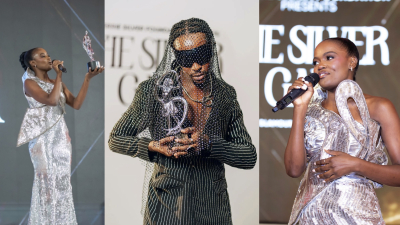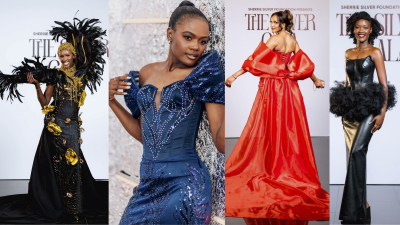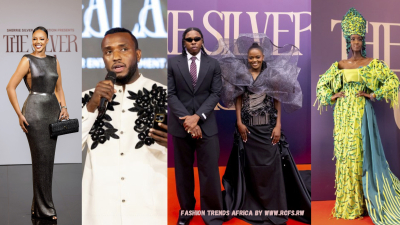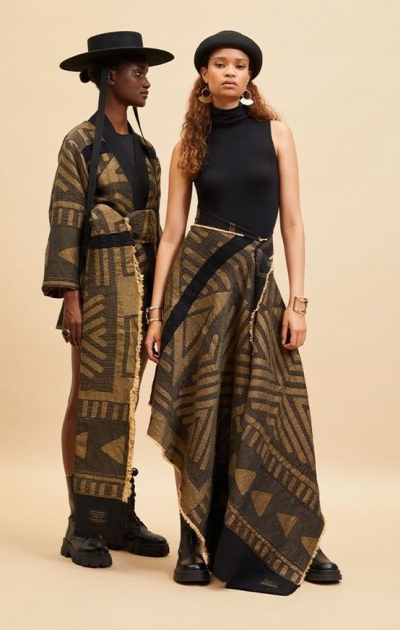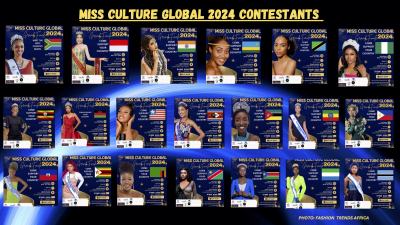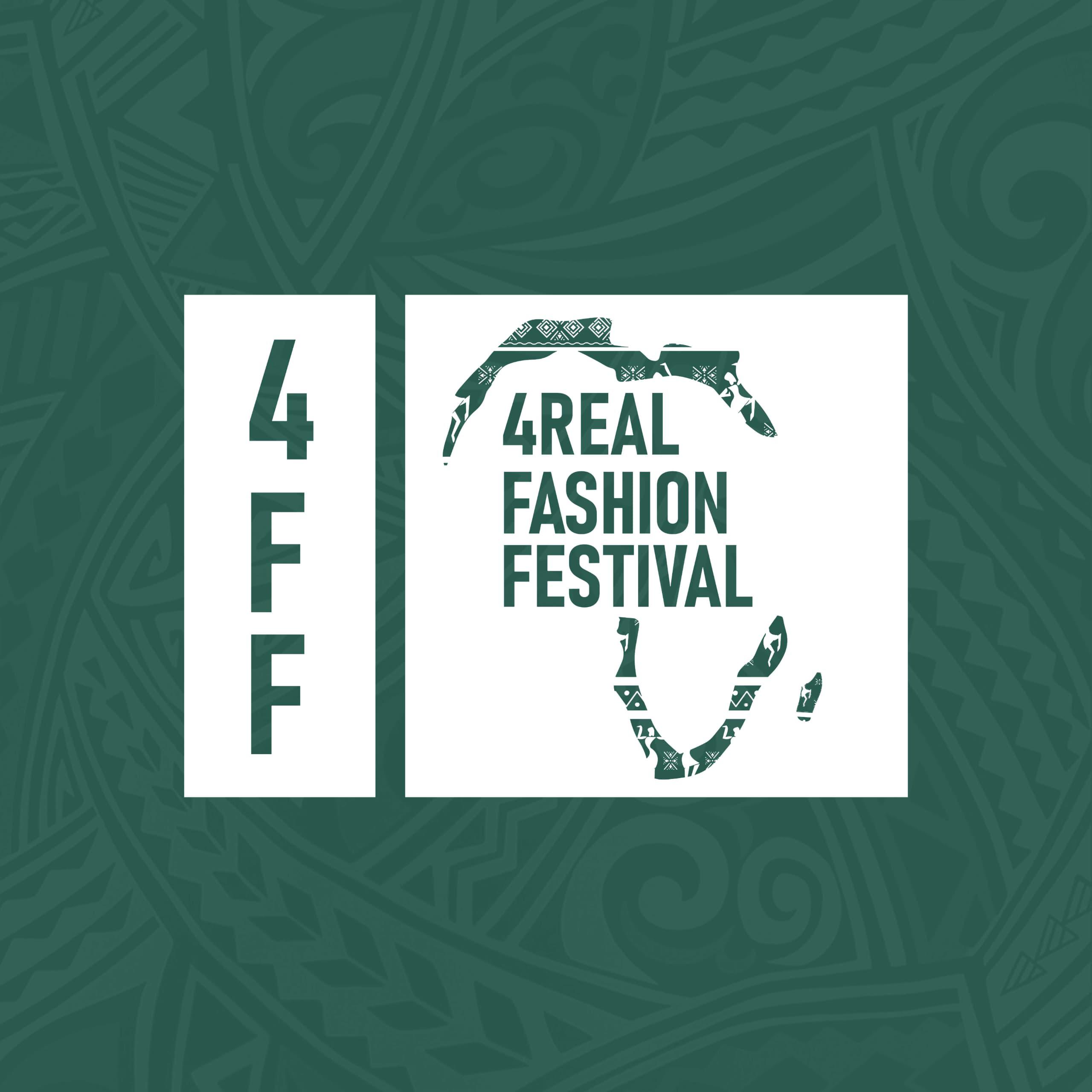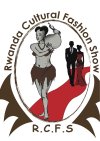
RCFS
Turning Locals into the Next Sustainable Fashion Designers in Kenya: Maisha by Nisria
When Nur M'Nasria, a TV film producer, came to Kenya in 2015 to document slum life, she couldn't have imagined how profoundly that journey would alter her path. Six years later, in 2021, she returned to Kenya with a new purpose: to establish a non-profit fashion and design studio that creates unique, handmade clothes from upcycled materials.
 Collection made by Maisha by Nisria based in Nakuru, Kenya [Photo Credit: MN]
Collection made by Maisha by Nisria based in Nakuru, Kenya [Photo Credit: MN]
In a recent interview, Nur M'Nasria shared insights into what drew her back to Kenya and the inspiration behind her innovative venture, Maisha by Nisria.
 Nur M'Nasria the Co-founder of Maisha by Nisria community organization based in Kenya [Photo Credit: MN]
Nur M'Nasria the Co-founder of Maisha by Nisria community organization based in Kenya [Photo Credit: MN]
The Heart of Maisha's Designs
"Every Maisha design is inspired by true stories and events," M'Nasria explains. She cites their HAYAT collection as an example, born from the memory of her friend Randah, who unexpectedly passed away in September. Randah had been instrumental in launching Maisha, investing in the necessary machinery and tools. Another poignant collection pays tribute to the young lost boys of South Sudan, forced into warfare at tender ages. This collection, a collaboration with The Nile Lot and Shak the Label, exemplifies Maisha's commitment to storytelling through fashion.
 A collection made by Maisha by Nisria based in Nakuru, Kenya [Photo Credit: MN]
A collection made by Maisha by Nisria based in Nakuru, Kenya [Photo Credit: MN]
Embracing Local Craftsmanship
When asked about her favorite Kenyan pieces, M'Nasria doesn't hesitate: "I love Kenyan jewelry, whether it's beads or brass." This appreciation for local craftsmanship is evident in Maisha's approach to fashion design and production.
 Fashion designers inside the Maisha by Nisria's workshop [Photo Credit: MN]
Fashion designers inside the Maisha by Nisria's workshop [Photo Credit: MN]
The Future of Fashion
M'Nasria believes that consumer awareness is shifting. "People are slowly becoming more concerned about the behind-the-scenes of how their garments are made," she observes. She predicts a rise in locally handmade, artisanal garments, which she believes will be preferred over fast fashion due to growing awareness of its negative cultural and environmental impact.
 The team from Maisha by Nisria community organization based in Kenya during the Nairobi Design Week 2024 [Photo Credit: MN]
The team from Maisha by Nisria community organization based in Kenya during the Nairobi Design Week 2024 [Photo Credit: MN]
Beyond Fashion: Personal Growth and Exploration
M'Nasria's interests extend beyond the realm of fashion. An avid consumer of audiobooks and podcasts, she's currently exploring various modalities of healing traumas. This holistic approach to personal growth likely influences her compassionate business model.

A collection made by Maisha by Nisria based in Nakuru, Kenya [Photo Credit: MN]
A Love for Kenya
While her work takes her across Kenya, M'Nasria has a soft spot for Nakuru. "I love the nature of Nakuru and how it is the perfect city yet a getaway destination," she shares, highlighting the diverse landscapes that inspire her work.
 Nur M'Nasria the Co-founder of Maisha by Nisria with her team in Nakuru- Kenya [Photo Credit: MN]
Nur M'Nasria the Co-founder of Maisha by Nisria with her team in Nakuru- Kenya [Photo Credit: MN]
Sustainability at the Core
During the Nairobi Design Week 2024, Maisha's project manager, Valentine Muthoni, elaborated on the studio's commitment to sustainability. "In terms of fashion sustainability, for us, it's steeped in slow fashion," Muthoni explains. "Every outfit you see here is one of a kind. We don't duplicate outfits compared to what organizations do in fast fashion."
Muthoni emphasizes their use of second-hand fabrics and textiles. "Everything here is upcycled from either waste textiles or second-hand fabrics," she states, underscoring Maisha's dedication to reducing waste and promoting circular fashion.
 Maisha's project manager, Valentine Muthoni [Photo Credit: MN]
Maisha's project manager, Valentine Muthoni [Photo Credit: MN]
Community Impact and Empowerment
Maisha by Nisria isn't just about creating sustainable fashion; it's about empowering local communities. By turning locals into fashion designers, the studio provides valuable skills and employment opportunities. This approach not only supports economic development but also ensures that the designs are authentically rooted in Kenyan culture and experiences.
The studio's commitment to one-of-a-kind pieces not only promotes sustainability but also celebrates individuality. Each garment tells a unique story, connecting the wearer to the artisan and the inspiration behind the design.
 A collection made by Maisha by Nisria based in Nakuru, Kenya [Photo Credit: MN]
A collection made by Maisha by Nisria based in Nakuru, Kenya [Photo Credit: MN]
A Growing Trend in Kenyan Fashion
Maisha by Nisria is part of a larger movement within Kenya's fashion industry. More designers are embracing sustainable practices, recognizing the urgent need to protect the environment while celebrating local craftsmanship and culture. This shift towards sustainable fashion in Kenya is multifaceted. It includes; Upcycling and recycling materials to reduce waste, embracing traditional techniques and materials, prioritizing fair labor practices and community development and educating consumers about the impact of their fashion choices.
 A collection made by Maisha by Nisria based in Nakuru, Kenya [Photo Credit: MN]
A collection made by Maisha by Nisria based in Nakuru, Kenya [Photo Credit: MN]
As the fashion industry in Kenya continues to grow, initiatives like Maisha by Nisria are setting a new standard. They demonstrate that fashion can be beautiful, meaningful, and responsible.
The story of Maisha by Nisria is more than just a tale of sustainable fashion. It's a narrative of cultural exchange, community empowerment, and environmental stewardship. As Nur M'Nasria and her team continue to create unique, story-driven pieces, they're not just designing clothes – they're crafting a new vision for the future of Kenyan fashion.
 A collection made by Maisha by Nisria based in Nakuru, Kenya [Photo Credit: MN]
A collection made by Maisha by Nisria based in Nakuru, Kenya [Photo Credit: MN]
In a world increasingly concerned with the environmental and social impact of consumer choices, Maisha by Nisria offers a compelling model. It shows how fashion can honor tradition, support communities, and protect the planet – all while producing stunning, one-of-a-kind garments that tell powerful stories.
 A collection made by Maisha by Nisria based in Nakuru, Kenya [Photo Credit: MN]
A collection made by Maisha by Nisria based in Nakuru, Kenya [Photo Credit: MN]
 A collection made by Maisha by Nisria based in Nakuru, Kenya [Photo Credit: MN]
A collection made by Maisha by Nisria based in Nakuru, Kenya [Photo Credit: MN]
Turning Locals into the Next Sustainable Fashion Designers in Kenya: Maisha by Nisria
When Nur M'Nasria, a TV film producer, came to Kenya in 2015 to document slum life, she couldn't have imagined how profoundly that journey would alter her path. Six years later, in 2021, she returned to Kenya with a new purpose: to establish a non-profit fashion and design studio that creates unique, handmade clothes from upcycled materials.
 A Collection made by Maisha by Nisria based in Nakuru, Kenya [Photo Credit: MN]
A Collection made by Maisha by Nisria based in Nakuru, Kenya [Photo Credit: MN]
In a recent interview, Nur M'Nasria shared insights into what drew her back to Kenya and the inspiration behind her innovative venture, Maisha by Nisria.
 Nur M'Nasria the Co-founder of Maisha by Nisria community organization based in Kenya [Photo Credit: MN]
Nur M'Nasria the Co-founder of Maisha by Nisria community organization based in Kenya [Photo Credit: MN]
The Heart of Maisha's Designs
"Every Maisha design is inspired by true stories and events," M'Nasria explains. She cites their HAYAT collection as an example, born from the memory of her friend Randah, who unexpectedly passed away in September. Randah had been instrumental in launching Maisha, investing in the necessary machinery and tools. Another poignant collection pays tribute to the young lost boys of South Sudan, forced into warfare at tender ages. This collection, a collaboration with The Nile Lot and Shak the Label, exemplifies Maisha's commitment to storytelling through fashion.
 A collection made by Maisha by Nisria based in Nakuru, Kenya [Photo Credit: MN]
A collection made by Maisha by Nisria based in Nakuru, Kenya [Photo Credit: MN]
Embracing Local Craftsmanship
When asked about her favorite Kenyan pieces, M'Nasria doesn't hesitate: "I love Kenyan jewelry, whether it's beads or brass." This appreciation for local craftsmanship is evident in Maisha's approach to fashion design and production.
 Fashion designers inside the Maisha by Nisria's workshop [Photo Credit: MN]
Fashion designers inside the Maisha by Nisria's workshop [Photo Credit: MN]
The Future of Fashion
M'Nasria believes that consumer awareness is shifting. "People are slowly becoming more concerned about the behind-the-scenes of how their garments are made," she observes. She predicts a rise in locally handmade, artisanal garments, which she believes will be preferred over fast fashion due to growing awareness of its negative cultural and environmental impact.
 The team from Maisha by Nisria community organization based in Kenya during the Nairobi Design Week 2024 [Photo Credit: MN]
The team from Maisha by Nisria community organization based in Kenya during the Nairobi Design Week 2024 [Photo Credit: MN]
Beyond Fashion: Personal Growth and Exploration
M'Nasria's interests extend beyond the realm of fashion. An avid consumer of audiobooks and podcasts, she's currently exploring various modalities of healing traumas. This holistic approach to personal growth likely influences her compassionate business model.

A collection made by Maisha by Nisria based in Nakuru, Kenya [Photo Credit: MN]
A Love for Kenya
While her work takes her across Kenya, M'Nasria has a soft spot for Nakuru. "I love the nature of Nakuru and how it is the perfect city yet a getaway destination," she shares, highlighting the diverse landscapes that inspire her work.
 Nur M'Nasria the Co-founder of Maisha by Nisria with her team in Nakuru- Kenya [Photo Credit: MN]
Nur M'Nasria the Co-founder of Maisha by Nisria with her team in Nakuru- Kenya [Photo Credit: MN]
Sustainability at the Core
During the Nairobi Design Week 2024, Maisha's project manager, Valentine Muthoni, elaborated on the studio's commitment to sustainability. "In terms of fashion sustainability, for us, it's steeped in slow fashion," Muthoni explains. "Every outfit you see here is one of a kind. We don't duplicate outfits compared to what organizations do in fast fashion."
Muthoni emphasizes their use of second-hand fabrics and textiles. "Everything here is upcycled from either waste textiles or second-hand fabrics," she states, underscoring Maisha's dedication to reducing waste and promoting circular fashion.
 Maisha's project manager, Valentine Muthoni [Photo Credit: MN]
Maisha's project manager, Valentine Muthoni [Photo Credit: MN]
Community Impact and Empowerment
Maisha by Nisria isn't just about creating sustainable fashion; it's about empowering local communities. By turning locals into fashion designers, the studio provides valuable skills and employment opportunities. This approach not only supports economic development but also ensures that the designs are authentically rooted in Kenyan culture and experiences.
The studio's commitment to one-of-a-kind pieces not only promotes sustainability but also celebrates individuality. Each garment tells a unique story, connecting the wearer to the artisan and the inspiration behind the design.
 A collection made by Maisha by Nisria based in Nakuru, Kenya [Photo Credit: MN]
A collection made by Maisha by Nisria based in Nakuru, Kenya [Photo Credit: MN]
A Growing Trend in Kenyan Fashion
Maisha by Nisria is part of a larger movement within Kenya's fashion industry. More designers are embracing sustainable practices, recognizing the urgent need to protect the environment while celebrating local craftsmanship and culture. This shift towards sustainable fashion in Kenya is multifaceted. It includes; Upcycling and recycling materials to reduce waste, embracing traditional techniques and materials, prioritizing fair labor practices and community development, and educating consumers about the impact of their fashion choices.
 A collection made by Maisha by Nisria based in Nakuru, Kenya [Photo Credit: MN]
A collection made by Maisha by Nisria based in Nakuru, Kenya [Photo Credit: MN]
As the fashion industry in Kenya continues to grow, initiatives like Maisha by Nisria are setting a new standard. They demonstrate that fashion can be beautiful, meaningful, and responsible.
The story of Maisha by Nisria is more than just a tale of sustainable fashion. It's a narrative of cultural exchange, community empowerment, and environmental stewardship. As Nur M'Nasria and her team continue to create unique, story-driven pieces, they're not just designing clothes – they're crafting a new vision for the future of Kenyan fashion.
 A collection made by Maisha by Nisria based in Nakuru, Kenya [Photo Credit: MN]
A collection made by Maisha by Nisria based in Nakuru, Kenya [Photo Credit: MN]
In a world increasingly concerned with the environmental and social impact of consumer choices, Maisha by Nisria offers a compelling model. It shows how fashion can honor tradition, support communities, and protect the planet – all while producing stunning, one-of-a-kind garments that tell powerful stories.
 A collection made by Maisha by Nisria based in Nakuru, Kenya [Photo Credit: MN]
A collection made by Maisha by Nisria based in Nakuru, Kenya [Photo Credit: MN]
 A collection made by Maisha by Nisria based in Nakuru, Kenya [Photo Credit: MN]
A collection made by Maisha by Nisria based in Nakuru, Kenya [Photo Credit: MN]
Tanga Designs Wins Best Dressed Male at The Silver Gala 2024: Interview with CEO Olivier Niyitanga
Tanga Designs has become a household name among fashion enthusiasts, renowned for creating unique clothing for both men and women. The brand's Tanga Bridal line, in particular, has gained recognition for its stunning wedding dresses and high-class collections designed for special events such as dinners and corporate gatherings.
 Third from left is Olivier Niyitanga, CEO and Creative Designer at Tanga Designs holding his award of the Best Dressed Male of the Silver Gala 2024 [Photo Credit: Inyarwanda]
Third from left is Olivier Niyitanga, CEO and Creative Designer at Tanga Designs holding his award of the Best Dressed Male of the Silver Gala 2024 [Photo Credit: Inyarwanda]
At The Silver Gala 2024, held at the Kigali Convention Center, Tanga Designs was awarded the title of Best Dressed Male. As CEO and creative designer Olivier Niyitanga, known simply as "Tanga," took to the stage, attendees were captivated by both his work and his striking outfit. Fashion Trends Africa by RCFS's MEDIA sat down with Tanga to discuss this achievement and his perspectives on the fashion industry.
 The outfit worn by Tanga the CEO and Creative designer at Tanga Designs during The Silver Gala 2024 raised emotions among fashion enthusiasts and Kigalians [Photo: Inyarwanda]
The outfit worn by Tanga the CEO and Creative designer at Tanga Designs during The Silver Gala 2024 raised emotions among fashion enthusiasts and Kigalians [Photo: Inyarwanda]
Q: What inspired your choice of a black and white suit for the event?
A: The decision to wear black and white, including the veil, was a deliberate choice to represent our brand. Our logo features these colors, and I wanted to embody the limitless nature of Tanga Bridal.
Q: Can you tell us about the specific design that won you the award?
A: The winning look was a culmination of our Tanga Bridal style, a theme that my team and I had been developing. It represents the essence of our brand's aesthetic and innovation.
Q: How would you define a "fashion enthusiast"?
A: To me, a fashion enthusiast is someone who genuinely loves and supports fashion unconditionally. It's not just about attending fashion shows; it's a lifestyle that permeates every aspect of one's being – from how you talk to how you walk. True fashion enthusiasts should be there to show their support for designers and the industry as a whole.
Q: How did winning the award at The Silver Gala 2024 make you feel, and what's next for Tanga Designs?
A: Receiving this award brought me back to the day I entered the fashion industry when I won "Best Fashion Designer" at Kigali Fashion Week. It's moments like these that continue to motivate me and remind me never to give up. Looking ahead, we're committed to creating more unique collections. I'm currently working on our new TANGA SS24 collection, aiming to inspire other fashion lovers and supporters.
Q: What are your thoughts on The Silver Gala 2024's collaboration with local fashion designers?
A: The Silver Gala 2024 provided a fantastic opportunity for young and upcoming designers to showcase their talents. As an established designer, it meant a lot to me to demonstrate confidence on stage and still win, setting an example for the younger generation. I'm grateful to Sherrie Silver and her team for organizing such an amazing show. Collaboration is key in our industry, and we're eagerly anticipating next year's edition.
Q: How did you perceive the creations of other designers at the event?
A: I was impressed by everyone's looks and the effort they put into their collections for this event. The confidence each designer displayed behind their work was admirable. I felt a great sense of support from my peers when I took the stage to receive the award for Best Dressed Male, which means a lot to me and my team.
Q: What set Tanga Designs apart from other showcased designers?
A: While all designers brought their best to the event, what set us apart was our concept inspired by Sherrie Silver's dress, which we designed for her. It featured silver embellishment details and truly embodied the spirit of the show. Additionally, the outfit I wore as the creative director was conceptually aligned and showcased with confidence and elegance on stage.
 A dress made by Tanga Designs for the international dancer and choreographer Sherrie Silver during The Silver Gala 2024 in Kigali [Photo Credit: The New Times]
A dress made by Tanga Designs for the international dancer and choreographer Sherrie Silver during The Silver Gala 2024 in Kigali [Photo Credit: The New Times]
ALSO READ: Who Was the Most Fashionable at the Silver Gala 2024 in Kigali?
Tanga Designs has participated in numerous high-profile fashion shows, and Olivier's dream is to continue his work while inspiring other young and upcoming fashion designers. "I am thrilled to be an inspiration to emerging designers, not only in Rwanda but across Africa," he says. "I encourage them to embrace their creativity and strive for uniqueness in their designs."
 A dress made by Tanga Designs for Sherrie Silver, MTV VMA Award winning choreographer [Photo Credit: The New Times]
A dress made by Tanga Designs for Sherrie Silver, MTV VMA Award winning choreographer [Photo Credit: The New Times]
Tanga Designs continues to make waves in the fashion industry, it's clear that Olivier Niyitanga's vision and talent will keep pushing boundaries and inspiring the next generation of African designers.
 Sherrie Silver's dress made by Tanga is unique and its creativity amazed the audience during - The Silver Gala 2024 in Kigali [Photo Credit: The New Times]
Sherrie Silver's dress made by Tanga is unique and its creativity amazed the audience during - The Silver Gala 2024 in Kigali [Photo Credit: The New Times]
Other photos of the Dresses designed and made by Tanga Designs







Tanga Designs Wins Best Dressed Male at The Silver Gala 2024: Interview with CEO Olivier Niyitanga
Tanga Designs has become a household name among fashion enthusiasts, renowned for creating unique clothing for both men and women. The brand's Tanga Bridal line, in particular, has gained recognition for its stunning wedding dresses and high-class collections designed for special events such as dinners and corporate gatherings.
 Third from left is Olivier Niyitanga, CEO and Creative Designer at Tanga Designs holding his award of the Best Dressed Male of the Silver Gala 2024 [Photo Credit: Inyarwanda]
Third from left is Olivier Niyitanga, CEO and Creative Designer at Tanga Designs holding his award of the Best Dressed Male of the Silver Gala 2024 [Photo Credit: Inyarwanda]
At The Silver Gala 2024, held at the Kigali Convention Center, Tanga Designs was awarded the title of Best Dressed Male. As CEO and creative designer Olivier Niyitanga, known simply as "Tanga," took to the stage, attendees were captivated by both his work and his striking outfit. Fashion Trends Africa by RCFS's MEDIA sat down with Tanga to discuss this achievement and his perspectives on the fashion industry.
 The outfit worn by Tanga the CEO and Creative designer at Tanga Designs during The Silver Gala 2024 raised emotions among fashion enthusiasts and Kigalians [Photo: Inyarwanda]
The outfit worn by Tanga the CEO and Creative designer at Tanga Designs during The Silver Gala 2024 raised emotions among fashion enthusiasts and Kigalians [Photo: Inyarwanda]
Q: What inspired your choice of a black and white suit for the event?
A: The decision to wear black and white, including the veil, was a deliberate choice to represent our brand. Our logo features these colors, and I wanted to embody the limitless nature of Tanga Bridal.
Q: Can you tell us about the specific design that won you the award?
A: The winning look was a culmination of our Tanga Bridal style, a theme that my team and I had been developing. It represents the essence of our brand's aesthetic and innovation.
Q: How would you define a "fashion enthusiast"?
A: To me, a fashion enthusiast is someone who genuinely loves and supports fashion unconditionally. It's not just about attending fashion shows; it's a lifestyle that permeates every aspect of one's being – from how you talk to how you walk. True fashion enthusiasts should be there to show their support for designers and the industry as a whole.
Q: How did winning the award at The Silver Gala 2024 make you feel, and what's next for Tanga Designs?
A: Receiving this award brought me back to the day I entered the fashion industry when I won "Best Fashion Designer" at Kigali Fashion Week. It's moments like these that continue to motivate me and remind me never to give up. Looking ahead, we're committed to creating more unique collections. I'm currently working on our new TANGA SS24 collection, aiming to inspire other fashion lovers and supporters.
Q: What are your thoughts on The Silver Gala 2024's collaboration with local fashion designers?
A: The Silver Gala 2024 provided a fantastic opportunity for young and upcoming designers to showcase their talents. As an established designer, it meant a lot to me to demonstrate confidence on stage and still win, setting an example for the younger generation. I'm grateful to Sherrie Silver and her team for organizing such an amazing show. Collaboration is key in our industry, and we're eagerly anticipating next year's edition.
Q: How did you perceive the creations of other designers at the event?
A: I was impressed by everyone's looks and the effort they put into their collections for this event. The confidence each designer displayed behind their work was admirable. I felt a great sense of support from my peers when I took the stage to receive the award for Best Dressed Male, which means a lot to me and my team.
Q: What set Tanga Designs apart from other showcased designers?
A: While all designers brought their best to the event, what set us apart was our concept inspired by Sherrie Silver's dress, which we designed for her. It featured silver embellishment details and truly embodied the spirit of the show. Additionally, the outfit I wore as the creative director was conceptually aligned and showcased with confidence and elegance on stage.
 A dress made by Tanga Designs for the international dancer and choreographer Sherrie Silver during The Silver Gala 2024 in Kigali [Photo Credit: The New Times]
A dress made by Tanga Designs for the international dancer and choreographer Sherrie Silver during The Silver Gala 2024 in Kigali [Photo Credit: The New Times]
ALSO READ: Who Was the Most Fashionable at the Silver Gala 2024 in Kigali?
Tanga Designs has participated in numerous high-profile fashion shows, and Olivier's dream is to continue his work while inspiring other young and upcoming fashion designers. "I am thrilled to be an inspiration to emerging designers, not only in Rwanda but across Africa," he says. "I encourage them to embrace their creativity and strive for uniqueness in their designs."
 A dress made by Tanga Designs for Sherrie Silver, MTV VMA Award winning choreographer [Photo Credit: The New Times]
A dress made by Tanga Designs for Sherrie Silver, MTV VMA Award winning choreographer [Photo Credit: The New Times]
Tanga Designs continues to make waves in the fashion industry, it's clear that Olivier Niyitanga's vision and talent will keep pushing boundaries and inspiring the next generation of African designers.
 Sherrie Silver's dress made by Tanga is unique and its creativity amazed the audience during - The Silver Gala 2024 in Kigali [Photo Credit: The New Times]
Sherrie Silver's dress made by Tanga is unique and its creativity amazed the audience during - The Silver Gala 2024 in Kigali [Photo Credit: The New Times]
Other photos of the Dresses designed and made by Tanga Designs







Top 10 Dresses That Raised Emotions at the Silver Gala 2024: A Night of Glamour, Entertainment, and Impact
Last weekend, fashion enthusiasts were treated to an unforgettable spectacle at the Silver Gala 2024. The event showcased an array of stunning dresses, each a masterpiece of creativity and craftsmanship. Celebrities, media personalities, supermodels, and international guests graced the event, donning outfits that left spectators in awe. What made this year's gala particularly special was that most of all the showstopping dresses were created by local fashion designers, with one talented individual clinching the coveted "Best Fashion Designer" award.
 In a black and white suit is Olivier Niyitanga CEO and Creative designer at Tanga Designs won the best fashion designer at The Silver Gala 2024- In a blue dress is Sherrie Silver
In a black and white suit is Olivier Niyitanga CEO and Creative designer at Tanga Designs won the best fashion designer at The Silver Gala 2024- In a blue dress is Sherrie Silver
The gala was a kaleidoscope of shimmering fabrics and vibrant hues, with each dress telling its own unique story. Here are the top 10 dresses that stirred emotions and captured the hearts of fashion enthusiasts:
1. Musician Bwiza Emmerance

2. International dancer and Choreographer Sherrie Silver

ALSO READ: Who Was the Most Fashionable at the Silver Gala 2024 in Kigali?
3. TV presenter Ring Darcy

4. Miss Dvine Muheto

5. Musician Alyn Sano

6. Beth Pearcey

7. Model Sandrine Mucyo

8. Media personality Isimbi Model

9. Miss Jolly Mutesi

10. Media personality Maddie Noella

11. Miss Naomie Nishimwe

12. International dancer and Choreographer Sherrie Silver

These dresses not only showcased the immense talent of local designers but also highlighted the event's commitment to promoting homegrown creativity. The Silver Gala 2024 proved to be more than just a night of glamour; it was a celebration of artistic vision, cultural pride, and the transformative power of fashion. As the curtains closed on this spectacular event, it left an indelible mark on the fashion industry, setting new standards for creativity and innovation in the years to come.
Who Was the Most Fashionable at the Silver Gala 2024 in Kigali?
Kigali's fashion scene reached new heights at the Silver Gala 2024, held at the Kigali Convention Center Auditorium. Organized by international choreographer Sherrie Silver, the event brought together business leaders, artists, and influencers in a dazzling display of style and creativity. With a strong emphasis on made-in-Rwanda fashion, the gala showcased the talent of local designers and the evolving sartorial tastes of Kigalians.
 Kigalian showing her fashion style and creativity at The Silver Gala 2024 [Photo Credit: Inyarwanda]
Kigalian showing her fashion style and creativity at The Silver Gala 2024 [Photo Credit: Inyarwanda]
Setting the Stage
Sherrie Silver, known for her MTV Award-winning choreography, set the tone for the event by encouraging attendees to support local talent. "We've put together a fashion directory featuring some of our favorite formal attire designers in Rwanda," Silver announced before the gala. This initiative not only promoted Rwandan fashion but also ensured that guests would arrive in unique, locally crafted ensembles.
 Attendees were very happy to take self [Photo Credit: IGIHE]
Attendees were very happy to take self [Photo Credit: IGIHE]
The red carpet was a parade of elegance and innovation, with every guest posing for a picture in front of a large white banner emblazoned with "The SILVER GALA" in shining white letters. Anet Umuhire, a fashion enthusiast who attended the event, described it as "an unforgettable evening of fashion." She noted the diversity of styles, saying, "Colors were shining, some were black and white, and others were green. It was a combination of all colors, and I loved it."
 From left; Miss Rwanda 2020, Naomie Nishimwe with Sherrie Silver on the red carpet [Photo Credit: IGIHE]
From left; Miss Rwanda 2020, Naomie Nishimwe with Sherrie Silver on the red carpet [Photo Credit: IGIHE]
Standout Looks of the Evening
Sherrie Silver
The hostess herself wore multiple stunning gowns that blended traditional Rwandan motifs with contemporary design. One notable dress, created by a local designer, featured a black base with gold and beaded accents, intricate beadwork, and a flowing silhouette that captured the essence of modern African fashion.
 [Photo Credit: Inyarwanda]
[Photo Credit: Inyarwanda]
Runtown
Nigerian artist Runtown, one of the VIP guests, opted for classic elegance in a black suit paired with a red tie and expensive black sunglasses. The 35-year-old singer, songwriter, and producer, known for hits like "Mad Over You" and "For Life," made a strong impression with his sleek ensemble.
 [Photo Credit: IGIHE]
[Photo Credit: IGIHE]
Lisa Quama Darko
Ghanaian dancer Lisa Quama Darko turned heads in a vibrant collection accessorized with black and white fabrics and touches of African beads. Her green and black hairstyle perfectly complemented the outfit, balancing African heritage with cutting-edge style.
 [Photo Credit: Inyarwanda]
[Photo Credit: Inyarwanda]
Beth Pearcey
UK dancer Beth Pearcey brought an international flair to the event, sporting a sleek, minimalist gown in striking all-red. The dress, made by a Rwandan designer, demonstrated the versatility and global appeal of local fashion.
 From right, UK dancer Beth Pearcey in a beautiful red dress [Photo Credit: Inyarwanda]
From right, UK dancer Beth Pearcey in a beautiful red dress [Photo Credit: Inyarwanda]
Fred Swaniker
Founder of the African Leadership Group, Fred Swaniker impressed in a well-tailored suit with a white shirt and black bowtie.
 Photo Credit: Inyarwanda]
Photo Credit: Inyarwanda]
Jolly Mutesi
Former Miss Rwanda 2016, Joyly Mutesi, wore a stunning dress that mixed shimmering gold with various colors. At 20, Mutesi was the first beauty queen to represent Rwanda in the Miss World competition.
 Photo Credit: Inyarwanda]
Photo Credit: Inyarwanda]
Masai Michael Ujiri
Toronto Raptors president Masai Michael Ujiri, known for his involvement in the Kigali BK Arena project, wore an all-gray outfit made in Africa. His monochromatic look stood out for its simplicity and elegance.
 Photo Credit: Inyarwanda]
Photo Credit: Inyarwanda]
Sandrine Mucyo
Former model Sandrine Mucyo captured attention in a dress created by local designer Matheo. The light green and yellow gown, adorned with a unique crown and intricate beadwork, was hailed as one of the night's top designs.
 Photo Credit: Inyarwanda]
Photo Credit: Inyarwanda]
Bwiza Emerance
Musician Bwiza Emerance, known by her stage name Bwiza, wore a unique all-black dress with feather accents. Her creativity and style earned her the Best Dressed Award for Ladies, showcasing the talent of the Matheo clothing brand based in Kigali.
 Photo Credit: IGIHE]
Photo Credit: IGIHE]
The Ben
Rwandan music sensation The Ben didn't disappoint in his role as the night's musical performer. He wore a custom-made ensemble that combined a classic tuxedo silhouette with unexpected textures and patterns, showcasing the innovative spirit of Rwanda's fashion scene.

Photo Credit: IGIHE]
Trends and Highlights
Many attendees embraced the opportunity to support local designers while making bold fashion statements. One notable trend was the use of upcycled materials, with several guests wearing outfits that incorporated recycled fabrics into high-fashion designs. This eco-conscious approach added an extra layer of meaning to the evening's fashion parade.
 Fashion designer Shema Gatean and musician Kevin Kade [Photo Credit: Inyarwanda]
Fashion designer Shema Gatean and musician Kevin Kade [Photo Credit: Inyarwanda]
Accessorizing played a crucial role in elevating many looks. Handcrafted jewelry from Rwandan artisans was prominently featured, with statement pieces adorning necks, wrists, and ears. These accessories not only completed the outfits but also highlighted the country's rich artistic heritage.
The gala's fashion wasn't limited to clothing. Innovative hairstyles and makeup looks complemented the outfits, with many attendees opting for styles that celebrated natural African beauty. Intricate braids, bold lip colors, and shimmering eye makeup were among the beauty trends that dominated the evening.
 Many people attended The Silver Gala 2024 [Photo Credit: Inyarwanda]
Many people attended The Silver Gala 2024 [Photo Credit: Inyarwanda]
More Than Just Fashion
As the night progressed, it became clear that the Silver Gala 2024 was more than just a fashion event. It was a celebration of Rwandan creativity, a platform for local designers to showcase their talent, and a testament to the country's growing influence in the global fashion industry.
 Rwandaise leading traditional singer and songwriter known as Intore Masamba [Photo Credit: IGIHE]
Rwandaise leading traditional singer and songwriter known as Intore Masamba [Photo Credit: IGIHE]
The fusion of traditional and modern elements in many outfits reflected Rwanda's current cultural moment – honoring its heritage while boldly stepping into the future. This balance was perhaps best exemplified by a group of young traditional dancers who attended in matching outfits that reimagined the traditional Rwandan imikenyero and Inshabure.
 Children from Sherrie Silver Foundatio dancing Rwanda's traditional dance [Photo Credit: Inyarwanda]
Children from Sherrie Silver Foundatio dancing Rwanda's traditional dance [Photo Credit: Inyarwanda]
While the gala's primary purpose was to raise funds for the Sherrie Silver Foundation, supporting over 660 children and youth, it also succeeded in elevating Rwanda's fashion profile. The event proved that Kigali is not just embracing global fashion trends but is actively contributing to them, with local designers and fashion enthusiasts leading the charge.
 Sherrie Silver Foundation supports children from different communities in Rwanda [Photo Credit: Inyarwanda]
Sherrie Silver Foundation supports children from different communities in Rwanda [Photo Credit: Inyarwanda]
"It was clear that everyone in attendance had contributed to a spectacular showcase of style," Anet stated. "From established designers to up-and-coming creatives, from business leaders to artists, the event demonstrated that fashion in Kigali is not just about looking good – it's about making a statement, supporting local talent, and pushing the boundaries of creativity."
The Most Fashionable?
Determining the most fashionable at the Silver Gala 2024 in Kigali is a challenging task. Perhaps it wasn't any single individual, but rather the collective spirit of innovation, cultural pride, and forward-thinking style that permeated the event. As Kigali continues to establish itself as a fashion capital, events like the Silver Gala serve as a reminder of the power of fashion to unite, inspire, and transform.
 Fashion lovers and fashion enthusiasts at the Silver Gala 2024 [Photo Credit: Inyarwanda]
Fashion lovers and fashion enthusiasts at the Silver Gala 2024 [Photo Credit: Inyarwanda]
The winner of the most creative fashion designer award was Olivier Niyitanga, CEO & Founder of Tanga Designs. Fittingly, he accepted the award in a striking black and white outfit, embodying the fusion of tradition and modernity that defined the evening.
 Third from left is Olivier Niyitanga, CEO & Founder of Tanga Designs. receiving the award of the best fashion designer of the Silver Gala 2024 [Photo Credit: Inyarwanda]
Third from left is Olivier Niyitanga, CEO & Founder of Tanga Designs. receiving the award of the best fashion designer of the Silver Gala 2024 [Photo Credit: Inyarwanda]
The Silver Gala 2024 in Kigali was more than just a showcase of individual style; it was a testament to Rwanda's burgeoning fashion industry and its ability to blend cultural heritage with contemporary design. The event not only highlighted the most fashionable individuals but also celebrated the collective creativity and vision of Kigali's fashion community, solidifying the city's place on the global fashion map.
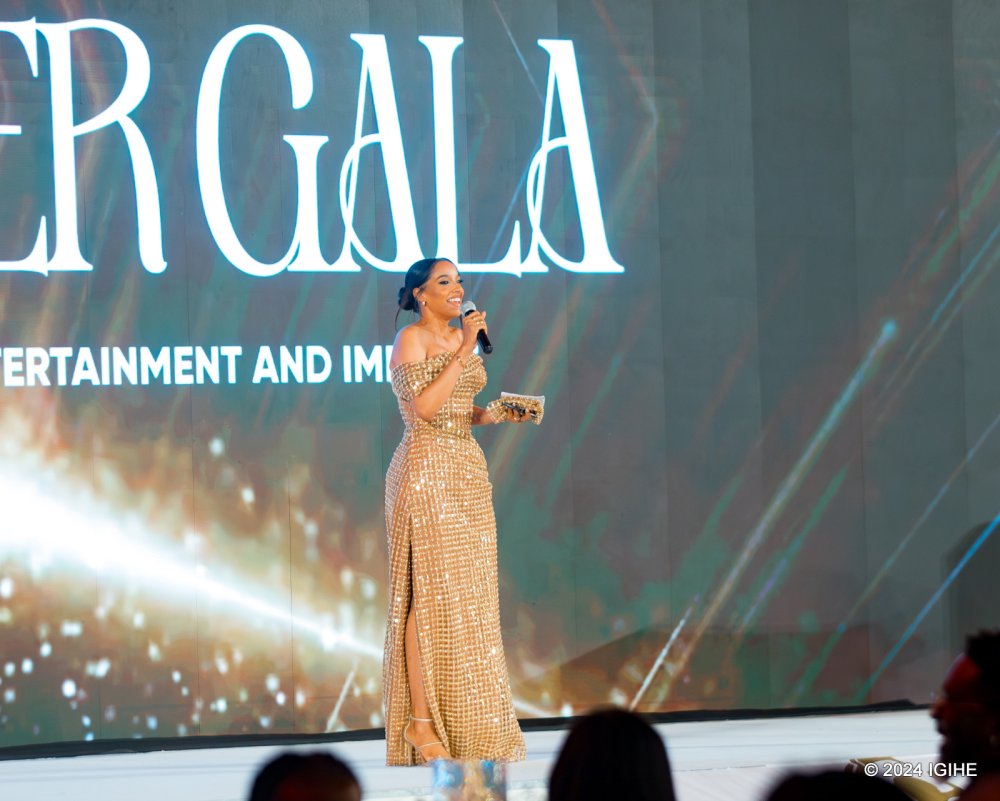 Media personality, MC, DJ, and journalist Makeda [Photo Credit: IGIHE]
Media personality, MC, DJ, and journalist Makeda [Photo Credit: IGIHE]
 Musician Aline Sano at The Silver Gala 2024 [Photo Credit: IGIHE}
Musician Aline Sano at The Silver Gala 2024 [Photo Credit: IGIHE}
 From left, Miss Naomie Nishimwe was the MC on the red carpet Interview Sherrie Silver [Photo credit: IGIHE]
From left, Miss Naomie Nishimwe was the MC on the red carpet Interview Sherrie Silver [Photo credit: IGIHE]

From left is Insh Kevin Rwandaise, a musician wearing a collection made by Izuba [Photo credit: Inyarwanda]
 Music producer, singer, and songwriter Element Eleeeh [Photo credit: IGIHE]
Music producer, singer, and songwriter Element Eleeeh [Photo credit: IGIHE]
 Media personality and journalist Andy Bumuntu [Photo Credit: IGIHE]
Media personality and journalist Andy Bumuntu [Photo Credit: IGIHE]
 From right is Rwandaise professional dancer Angel Karabo with Ghanaian dancer Lisa Quama [Photo Credit: Inyarwanda]
From right is Rwandaise professional dancer Angel Karabo with Ghanaian dancer Lisa Quama [Photo Credit: Inyarwanda]
 From right, Arthur Nkusi, actor, comedian, and journalist with Sherrie Silver [Photo Credit: Inyarwanda]
From right, Arthur Nkusi, actor, comedian, and journalist with Sherrie Silver [Photo Credit: Inyarwanda]
 From right is the former model and media personality known as Isimbi model, and her husband [Photo Credit: Inyarwanda]
From right is the former model and media personality known as Isimbi model, and her husband [Photo Credit: Inyarwanda]
 Media personality and content digital, creator Erica Mbanda [Photo credit: Inyarwanda]
Media personality and content digital, creator Erica Mbanda [Photo credit: Inyarwanda]
 Media personality and personal blogger Maddie Noella [Photo credit: Inyarwanda]
Media personality and personal blogger Maddie Noella [Photo credit: Inyarwanda]
 From left is Claire Akamanzi former RDB CEO, and CEO of NBA Africa, Sherrie Silver, and Founder of the African Leadership Group, Fred Swaniker [Photo Credit: Inyarwanda]
From left is Claire Akamanzi former RDB CEO, and CEO of NBA Africa, Sherrie Silver, and Founder of the African Leadership Group, Fred Swaniker [Photo Credit: Inyarwanda]
 Fashionable Rwanda Broadcasting Agency -RBA Journalists during The Silver Gala 2024[Photo Credit: Inyarwanda]
Fashionable Rwanda Broadcasting Agency -RBA Journalists during The Silver Gala 2024[Photo Credit: Inyarwanda]
 Very fashionable women enjoying together with Kigalians fashion lovers at The Silver Gala 2024 [Photo credit: Inyarwanda]
Very fashionable women enjoying together with Kigalians fashion lovers at The Silver Gala 2024 [Photo credit: Inyarwanda]
Who Was the Most Fashionable at the Silver Gala 2024 in Kigali?
Kigali's fashion scene reached new heights at the Silver Gala 2024, held at the Kigali Convention Center Auditorium. Organized by international choreographer Sherrie Silver, the event brought together business leaders, artists, and influencers in a dazzling display of style and creativity. With a strong emphasis on made-in-Rwanda fashion, the gala showcased the talent of local designers and the evolving sartorial tastes of Kigalians.
 Kigalian showing her fashion style and creativity at The Silver Gala 2024 [Photo Credit: Inyarwanda]
Kigalian showing her fashion style and creativity at The Silver Gala 2024 [Photo Credit: Inyarwanda]
Setting the Stage
Sherrie Silver, known for her MTV Award-winning choreography, set the tone for the event by encouraging attendees to support local talent. "We've put together a fashion directory featuring some of our favorite formal attire designers in Rwanda," Silver announced before the gala. This initiative not only promoted Rwandan fashion but also ensured that guests would arrive in unique, locally crafted ensembles.
 Attendees were very happy to take self [Photo Credit: IGIHE]
Attendees were very happy to take self [Photo Credit: IGIHE]
The red carpet was a parade of elegance and innovation, with every guest posing for a picture in front of a large white banner emblazoned with "The SILVER GALA" in shining white letters. Anet Umuhire, a fashion enthusiast who attended the event, described it as "an unforgettable evening of fashion." She noted the diversity of styles, saying, "Colors were shining, some were black and white, and others were green. It was a combination of all colors, and I loved it."
 From left; Miss Rwanda 2020, Naomie Nishimwe with Sherrie Silver on the red carpet [Photo Credit: IGIHE]
From left; Miss Rwanda 2020, Naomie Nishimwe with Sherrie Silver on the red carpet [Photo Credit: IGIHE]
Standout Looks of the Evening
Sherrie Silver
The hostess herself wore multiple stunning gowns that blended traditional Rwandan motifs with contemporary design. One notable dress, created by a local designer, featured a black base with gold and beaded accents, intricate beadwork, and a flowing silhouette that captured the essence of modern African fashion.
 [Photo Credit: Inyarwanda]
[Photo Credit: Inyarwanda]
Runtown
Nigerian artist Runtown, one of the VIP guests, opted for classic elegance in a black suit paired with a red tie and expensive black sunglasses. The 35-year-old singer, songwriter, and producer, known for hits like "Mad Over You" and "For Life," made a strong impression with his sleek ensemble.
 [Photo Credit: IGIHE]
[Photo Credit: IGIHE]
Lisa Quama Darko
Ghanaian dancer Lisa Quama Darko turned heads in a vibrant collection accessorized with black and white fabrics and touches of African beads. Her green and black hairstyle perfectly complemented the outfit, balancing African heritage with cutting-edge style.
 [Photo Credit: Inyarwanda]
[Photo Credit: Inyarwanda]
Beth Pearcey
UK dancer Beth Pearcey brought an international flair to the event, sporting a sleek, minimalist gown in striking all-red. The dress, made by a Rwandan designer, demonstrated the versatility and global appeal of local fashion.
 From right, UK dancer Beth Pearcey in a beautiful red dress [Photo Credit: Inyarwanda]
From right, UK dancer Beth Pearcey in a beautiful red dress [Photo Credit: Inyarwanda]
Fred Swaniker
Founder of the African Leadership Group, Fred Swaniker impressed in a well-tailored suit with a white shirt and black bowtie.
 Photo Credit: Inyarwanda]
Photo Credit: Inyarwanda]
Jolly Mutesi
Former Miss Rwanda 2016, Joyly Mutesi, wore a stunning dress that mixed shimmering gold with various colors. At 20, Mutesi was the first beauty queen to represent Rwanda in the Miss World competition.
 Photo Credit: Inyarwanda]
Photo Credit: Inyarwanda]
Masai Michael Ujiri
Toronto Raptors president Masai Michael Ujiri, known for his involvement in the Kigali BK Arena project, wore an all-gray outfit made in Africa. His monochromatic look stood out for its simplicity and elegance.
 Photo Credit: Inyarwanda]
Photo Credit: Inyarwanda]
Sandrine Mucyo
Former model Sandrine Mucyo captured attention in a dress created by local designer Matheo. The light green and yellow gown, adorned with a unique crown and intricate beadwork, was hailed as one of the night's top designs.
 Photo Credit: Inyarwanda]
Photo Credit: Inyarwanda]
Bwiza Emerance
Musician Bwiza Emerance, known by her stage name Bwiza, wore a unique all-black dress with feather accents. Her creativity and style earned her the Best Dressed Award for Ladies, showcasing the talent of the Matheo clothing brand based in Kigali.
 Photo Credit: IGIHE]
Photo Credit: IGIHE]
The Ben
Rwandan music sensation The Ben didn't disappoint in his role as the night's musical performer. He wore a custom-made ensemble that combined a classic tuxedo silhouette with unexpected textures and patterns, showcasing the innovative spirit of Rwanda's fashion scene.

Photo Credit: IGIHE]
Trends and Highlights
Many attendees embraced the opportunity to support local designers while making bold fashion statements. One notable trend was the use of upcycled materials, with several guests wearing outfits that incorporated recycled fabrics into high-fashion designs. This eco-conscious approach added an extra layer of meaning to the evening's fashion parade.
 Fashion designer Shema Gatean and musician Kevin Kade [Photo Credit: Inyarwanda]
Fashion designer Shema Gatean and musician Kevin Kade [Photo Credit: Inyarwanda]
Accessorizing played a crucial role in elevating many looks. Handcrafted jewelry from Rwandan artisans was prominently featured, with statement pieces adorning necks, wrists, and ears. These accessories not only completed the outfits but also highlighted the country's rich artistic heritage.
The gala's fashion wasn't limited to clothing. Innovative hairstyles and makeup looks complemented the outfits, with many attendees opting for styles that celebrated natural African beauty. Intricate braids, bold lip colors, and shimmering eye makeup were among the beauty trends that dominated the evening.
 Many people attended The Silver Gala 2024 [Photo Credit: Inyarwanda]
Many people attended The Silver Gala 2024 [Photo Credit: Inyarwanda]
More Than Just Fashion
As the night progressed, it became clear that the Silver Gala 2024 was more than just a fashion event. It was a celebration of Rwandan creativity, a platform for local designers to showcase their talent, and a testament to the country's growing influence in the global fashion industry.
 Rwandaise leading traditional singer and songwriter known as Intore Masamba [Photo Credit: IGIHE]
Rwandaise leading traditional singer and songwriter known as Intore Masamba [Photo Credit: IGIHE]
The fusion of traditional and modern elements in many outfits reflected Rwanda's current cultural moment – honoring its heritage while boldly stepping into the future. This balance was perhaps best exemplified by a group of young traditional dancers who attended in matching outfits that reimagined the traditional Rwandan imikenyero and Inshabure.
 Children from Sherrie Silver Foundation dancing Rwanda's traditional dance [Photo Credit: Inyarwanda]
Children from Sherrie Silver Foundation dancing Rwanda's traditional dance [Photo Credit: Inyarwanda]
While the gala's primary purpose was to raise funds for the Sherrie Silver Foundation, supporting over 660 children and youth, it also succeeded in elevating Rwanda's fashion profile. The event proved that Kigali is not just embracing global fashion trends but is actively contributing to them, with local designers and fashion enthusiasts leading the charge.
 Sherrie Silver Foundation supports children from different communities in Rwanda [Photo Credit: Inyarwanda]
Sherrie Silver Foundation supports children from different communities in Rwanda [Photo Credit: Inyarwanda]
"It was clear that everyone in attendance had contributed to a spectacular showcase of style," Anet stated. "From established designers to up-and-coming creatives, from business leaders to artists, the event demonstrated that fashion in Kigali is not just about looking good – it's about making a statement, supporting local talent, and pushing the boundaries of creativity."
The Most Fashionable?
Determining the most fashionable at the Silver Gala 2024 in Kigali is a challenging task. Perhaps it wasn't any single individual, but rather the collective spirit of innovation, cultural pride, and forward-thinking style that permeated the event. As Kigali continues to establish itself as a fashion capital, events like the Silver Gala serve as a reminder of the power of fashion to unite, inspire, and transform.
 Fashion lovers and fashion enthusiasts at the Silver Gala 2024 [Photo Credit: Inyarwanda]
Fashion lovers and fashion enthusiasts at the Silver Gala 2024 [Photo Credit: Inyarwanda]
The winner of the most creative fashion designer award was Olivier Niyitanga, CEO & Founder of Tanga Designs. Fittingly, he accepted the award in a striking black and white outfit, embodying the fusion of tradition and modernity that defined the evening.
 Third from left is Olivier Niyitanga, CEO & Founder of Tanga Designs. receiving the award of the best fashion designer of the Silver Gala 2024 [Photo Credit: Inyarwanda]
Third from left is Olivier Niyitanga, CEO & Founder of Tanga Designs. receiving the award of the best fashion designer of the Silver Gala 2024 [Photo Credit: Inyarwanda]
The Silver Gala 2024 in Kigali was more than just a showcase of individual style; it was a testament to Rwanda's burgeoning fashion industry and its ability to blend cultural heritage with contemporary design. The event not only highlighted the most fashionable individuals but also celebrated the collective creativity and vision of Kigali's fashion community, solidifying the city's place on the global fashion map.
 Media personality, MC, DJ, and journalist Makeda [Photo Credit: IGIHE]
Media personality, MC, DJ, and journalist Makeda [Photo Credit: IGIHE]
 Musician Aline Sano at The Silver Gala 2024 [Photo Credit: IGIHE}
Musician Aline Sano at The Silver Gala 2024 [Photo Credit: IGIHE}
 From left, Miss Naomie Nishimwe was the MC on the red carpet Interview Sherrie Silver [Photo credit: IGIHE]
From left, Miss Naomie Nishimwe was the MC on the red carpet Interview Sherrie Silver [Photo credit: IGIHE]

From left is Insh Kevin Rwandaise, a musician wearing a collection made by Izuba [Photo credit: Inyarwanda]
 Music producer, singer, and songwriter Element Eleeeh [Photo credit: IGIHE]
Music producer, singer, and songwriter Element Eleeeh [Photo credit: IGIHE]
 Media personality and journalist Andy Bumuntu [Photo Credit: IGIHE]
Media personality and journalist Andy Bumuntu [Photo Credit: IGIHE]
 From right is Rwandaise professional dancer Angel Karabo with Ghanaian dancer Lisa Quama [Photo Credit: Inyarwanda]
From right is Rwandaise professional dancer Angel Karabo with Ghanaian dancer Lisa Quama [Photo Credit: Inyarwanda]
 From right, Arthur Nkusi, actor, comedian, and journalist with Sherrie Silver [Photo Credit: Inyarwanda]
From right, Arthur Nkusi, actor, comedian, and journalist with Sherrie Silver [Photo Credit: Inyarwanda]
 From right is the former model and media personality known as Isimbi model, and her husband [Photo Credit: Inyarwanda]
From right is the former model and media personality known as Isimbi model, and her husband [Photo Credit: Inyarwanda]
 Media personality and content digital, creator Erica Mbanda [Photo credit: Inyarwanda]
Media personality and content digital, creator Erica Mbanda [Photo credit: Inyarwanda]
 Media personality and personal blogger Maddie Noella [Photo credit: Inyarwanda]
Media personality and personal blogger Maddie Noella [Photo credit: Inyarwanda]
 From left is Claire Akamanzi former RDB CEO, and CEO of NBA Africa, Sherrie Silver, and Founder of the African Leadership Group, Fred Swaniker [Photo Credit: Inyarwanda]
From left is Claire Akamanzi former RDB CEO, and CEO of NBA Africa, Sherrie Silver, and Founder of the African Leadership Group, Fred Swaniker [Photo Credit: Inyarwanda]
 Fashionable Rwanda Broadcasting Agency -RBA Journalists during The Silver Gala 2024[Photo Credit: Inyarwanda]
Fashionable Rwanda Broadcasting Agency -RBA Journalists during The Silver Gala 2024[Photo Credit: Inyarwanda]
 Very fashionable women enjoying together with Kigalians fashion lovers at The Silver Gala 2024 [Photo credit: Inyarwanda]
Very fashionable women enjoying together with Kigalians fashion lovers at The Silver Gala 2024 [Photo credit: Inyarwanda]
What are the Innovations Behind African Print?
African print, with its vibrant colors and bold patterns, has long been a symbol of cultural identity and artistic expression across the continent. In recent years, this iconic textile tradition has undergone a remarkable transformation, driven by innovation and a renewed focus on sustainability and cultural integration. From cutting-edge production techniques to creative reinterpretations of traditional motifs, the world of African print is evolving to meet the demands of the 21st century while staying true to its rich heritage.
Technological Advancements in Fabric Design and Production
One of the most significant innovations in African print is the integration of technology into the design and production process. Digital printing techniques have revolutionized the industry, allowing for more intricate patterns, a wider range of colors, and faster production times. This technological leap has enabled designers to experiment with complex designs that were previously impossible or too time-consuming to create using traditional methods.
3D printing is another exciting development in the field. Innovative designers are using this technology to create unique textures and embellishments that can be incorporated into African print fabrics, adding a new dimension to the tactile experience of the textiles. This fusion of traditional patterns with modern technology is opening up new possibilities for creativity and customization.
Additionally, software applications specifically designed for textile creation are empowering a new generation of African designers. These tools allow for rapid prototyping and visualization of patterns, making it easier for creators to iterate and refine their designs before moving to production.

Sustainability: A New Focus
As global awareness of environmental issues grows, the African print industry is increasingly embracing sustainable practices. Eco-friendly dyes derived from natural sources such as plants and minerals are being used to create vibrant colors without harmful chemicals. This not only reduces the environmental impact of production but also aligns with traditional African dyeing techniques, creating a beautiful synergy between ancient practices and modern concerns.
Recycled materials are finding their way into African print production as well. Innovative companies are developing methods to turn plastic waste into fibers that can be woven into fabrics, giving new life to discarded materials and addressing the pressing issue of plastic pollution.
Water conservation is another area where innovation is making a difference. Advanced dyeing techniques that use significantly less water are being adopted, helping to preserve this precious resource in water-scarce regions of Africa.
Cultural Integration and Contemporary Interpretations
The evolution of African print is not just about technology and sustainability; it's also about reimagining cultural heritage for a global audience. Contemporary African designers are pushing boundaries by blending traditional patterns with modern aesthetics, creating pieces that resonate with both local and international markets.
One innovative approach is the fusion of African prints with other global textile traditions. For example, some designers are incorporating elements of Japanese shibori or Indian block printing into their African-inspired designs, creating unique cross-cultural dialogues through fabric.
Digital platforms and social media have played a crucial role in this cultural integration, allowing African designers to showcase their work to a global audience and collaborate with artists from around the world. This exposure has led to exciting partnerships and the incorporation of African prints into high fashion, streetwear, and even interior design on an international scale.
Customization and Personal Expression
Innovation in African print is also empowering individual expression. Print-on-demand services are allowing customers to create personalized African-inspired designs, choosing colors, patterns, and even adding personal motifs. This level of customization was previously unthinkable but is now becoming increasingly accessible thanks to digital printing technologies.
Moreover, augmented reality (AR) apps are being developed to allow consumers to visualize how different African print designs would look as garments or home decor before making a purchase. This innovative use of technology is not only enhancing the shopping experience but also reducing waste by helping customers make more informed choices.
Education and Preservation of Traditional Techniques
While embracing innovation, there's also a growing movement to preserve and educate about traditional African textile techniques. Digital archives and virtual museums are being created to document the history and significance of various African prints and patterns. These platforms serve as invaluable resources for designers, students, and enthusiasts, ensuring that the rich cultural heritage behind African print is not lost in the rush towards modernization.
Some innovative projects are using blockchain technology to create a digital ledger of African textile designs, helping to protect intellectual property rights and ensure that traditional communities receive recognition and compensation for their cultural contributions.
The Future of African Print
As we look to the future, the innovations behind African print show no signs of slowing down. From biodegradable fabrics to AI-generated patterns inspired by traditional motifs, the possibilities are endless. What remains constant is the spirit of creativity, cultural pride, and adaptability that has always characterized African textile traditions.
The revolution in African print is not just about creating beautiful fabrics; it's about weaving together tradition and innovation, sustainability and cultural expression. As African designers continue to push boundaries and experiment with new technologies and ideas, they are not only preserving their heritage but also shaping the future of global fashion and textile design.
In this era of innovation, African print stands as a testament to the power of cultural resilience and creative adaptation. It reminds us that even the most time-honored traditions can evolve and thrive in the face of change, becoming ever more relevant and inspiring in our modern world.

Who Will Win Miss Culture Global 2024?: 20 Countries will be Represented
The Miss Culture Global Grand Finale 2024 is set to dazzle audiences in Sandton, Johannesburg, South Africa. This prestigious event will unfold at the exquisite Cedarwood of Sandton in Woodmead, bringing together 20 contestants from diverse nations to compete for the coveted crown
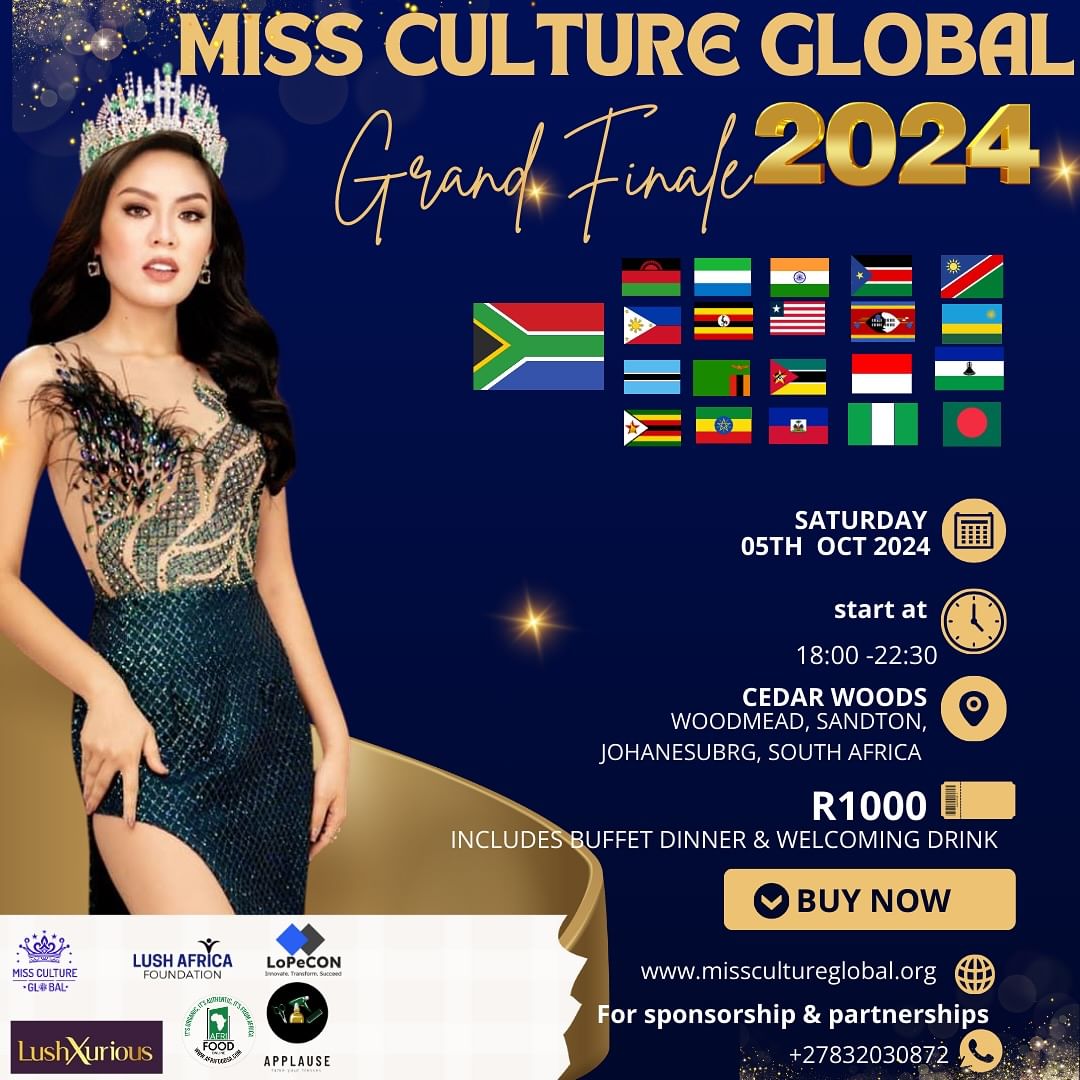
Lorraine Kljajic, CEO of Miss Culture Global and the visionary behind this continental pageant, spoke with RCFS's Media about the upcoming event. "We have confirmed participation from 20 countries, and we're finalizing the list shortly," Kljajic stated. "Our next steps involve strengthening communication with participants and assisting with travel arrangements, including flight bookings and airport transfers for those coming from outside Africa."
The pageant's mission extends beyond beauty, aiming to empower women regardless of their physical attributes. "This event provides an opportunity for all women, irrespective of their size, height, or skin color," Kljajic emphasized. "Our main objective is to empower these women through entrepreneurship and education."
Kljajic and her team are actively seeking partnerships to amplify their impact on the African community. "We're looking for more partners to help us achieve our objectives," she explained. "There's still time for interested parties to get involved and support our cause. Those who can't join us this year are welcome to collaborate in the future."
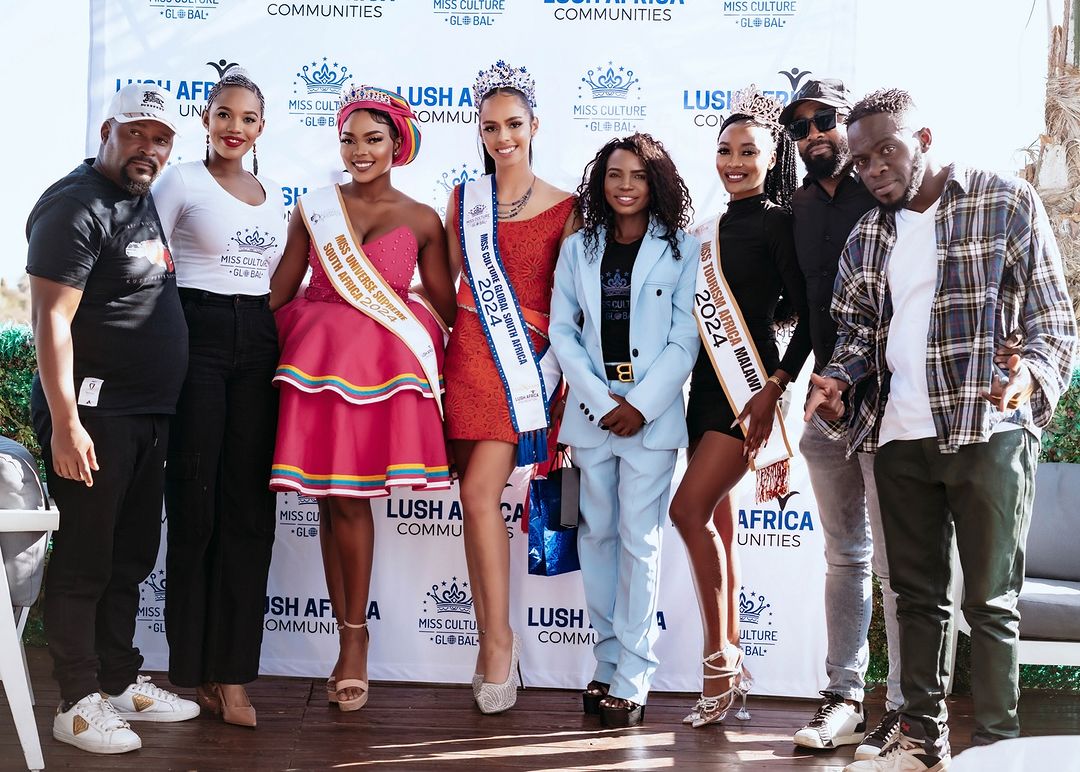 Fouth from the Right- Lorraine Kljajic, CEO of Miss Culture Global with the winner Miss Culture Global South Africa
Fouth from the Right- Lorraine Kljajic, CEO of Miss Culture Global with the winner Miss Culture Global South Africa
The choice of venue underscores the event's prestige. "The Cedarwood of Sandton offers a stunning backdrop for this event," Kljajic noted. "Located in the heart of Woodmead, it provides an elegant setting, ensuring an unforgettable experience for all involved."
MISS CULTURE GLOBAL, run by the Lush Africa Foundation, is more than just a beauty pageant. It's a platform designed to showcase talent, empower individuals, and celebrate diversity. The organization's core focus is to unite people from various cultures, fostering mutual learning and understanding in pursuit of transformation and change.
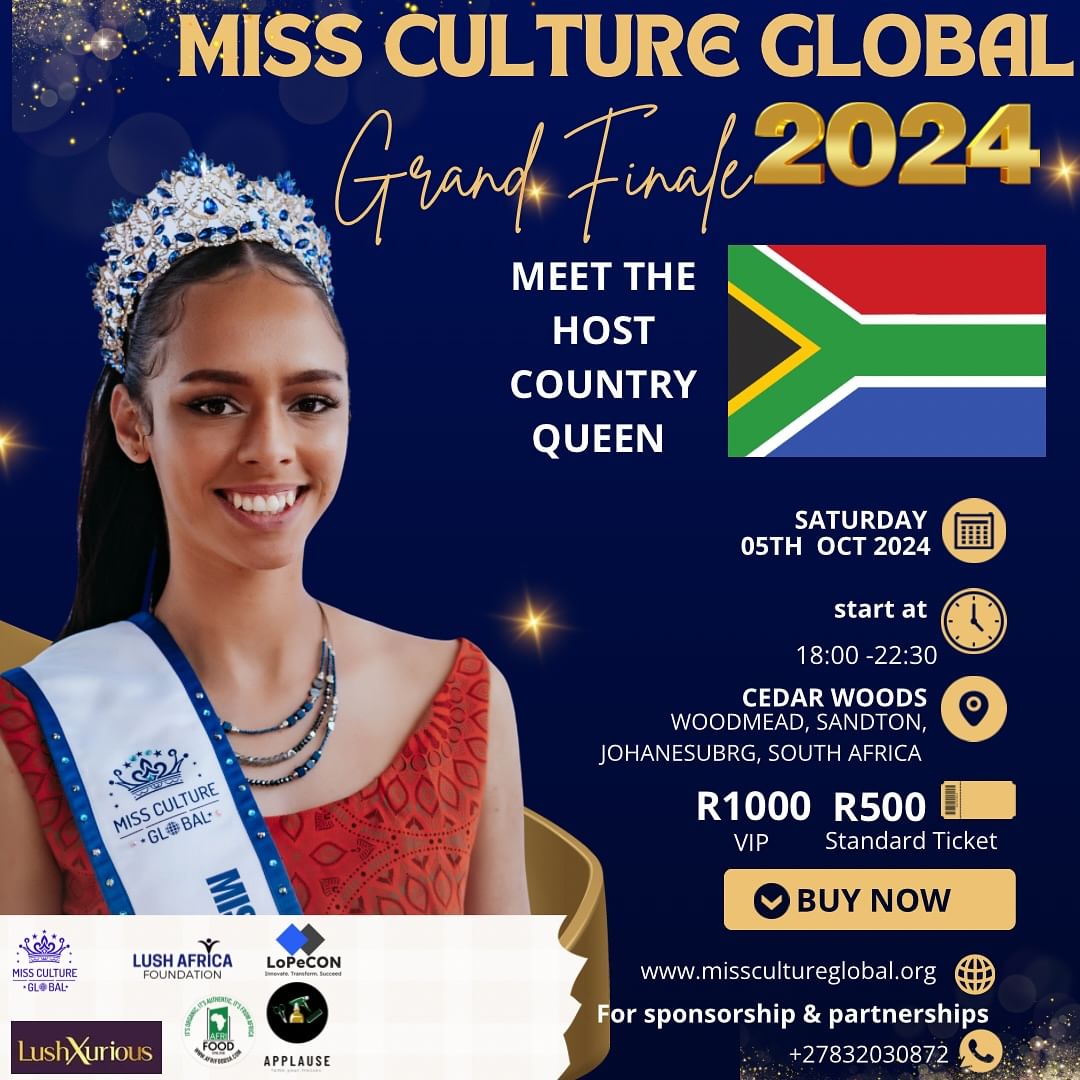 Contestant representing South Africa in Miss Culture Global 2024
Contestant representing South Africa in Miss Culture Global 2024
ALSO READ: All Eyes on Africa: Miss Culture Global Grande Finale 2024 in Johannesburg
Key objectives of Miss Culture Global include:
- Promoting art, culture, and tourism destinations worldwide
- Empowering young women through personal development and talent cultivation
- Encouraging volunteer activities and cultural events
- Creating an environment that embraces cultural differences, promoting unity and humanity
- Facilitating creativity and information exchange among different nationalities
- Attracting investment to host countries and cities, fostering business opportunities and employment
As the grand finale approaches, anticipation builds for this unique celebration of beauty, culture, and empowerment. The event promises not only to crown a winner but also to foster global understanding and showcase the rich tapestry of human diversity. With contestants from 20 countries vying for the title, Miss Culture Global 2024 is poised to be a spectacular display of talent, grace, and cultural pride. As the world watches, one question remains: Who will emerge victorious and claim the crown of Miss Culture Global 2024?
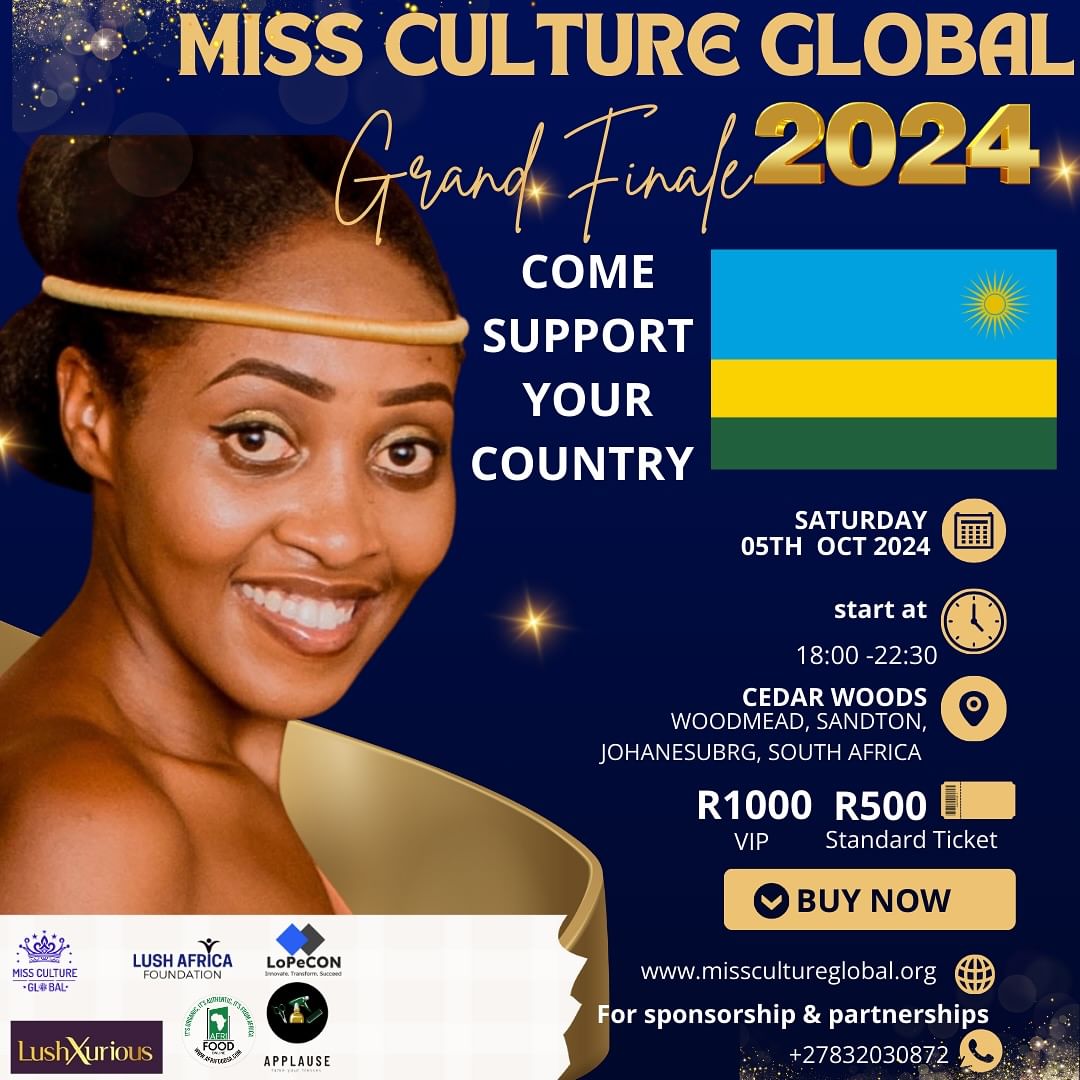 Contestant representing Rwanda in Miss Culture Global 2024
Contestant representing Rwanda in Miss Culture Global 2024
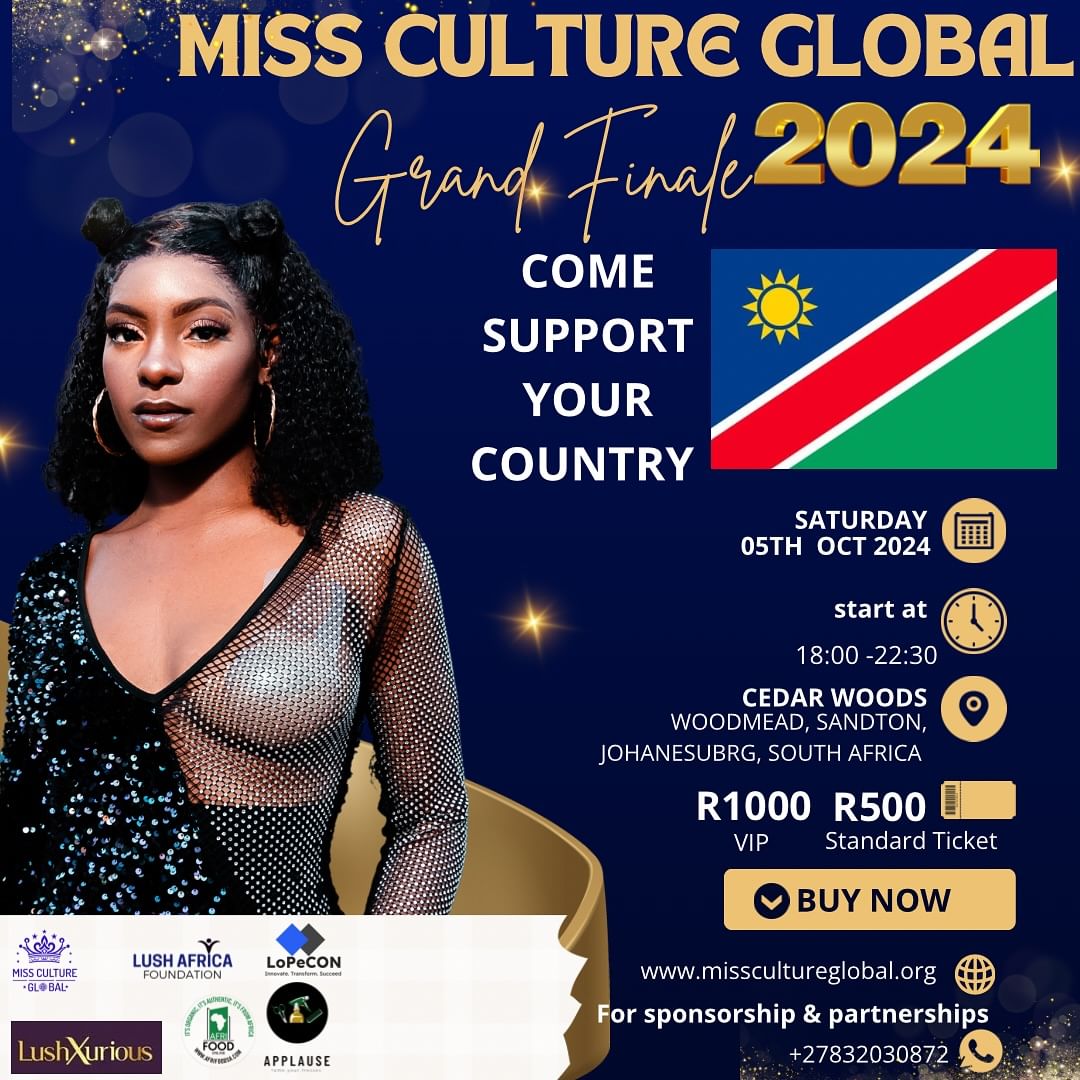 Contestant representing Namibia in Miss Culture Global 2024
Contestant representing Namibia in Miss Culture Global 2024
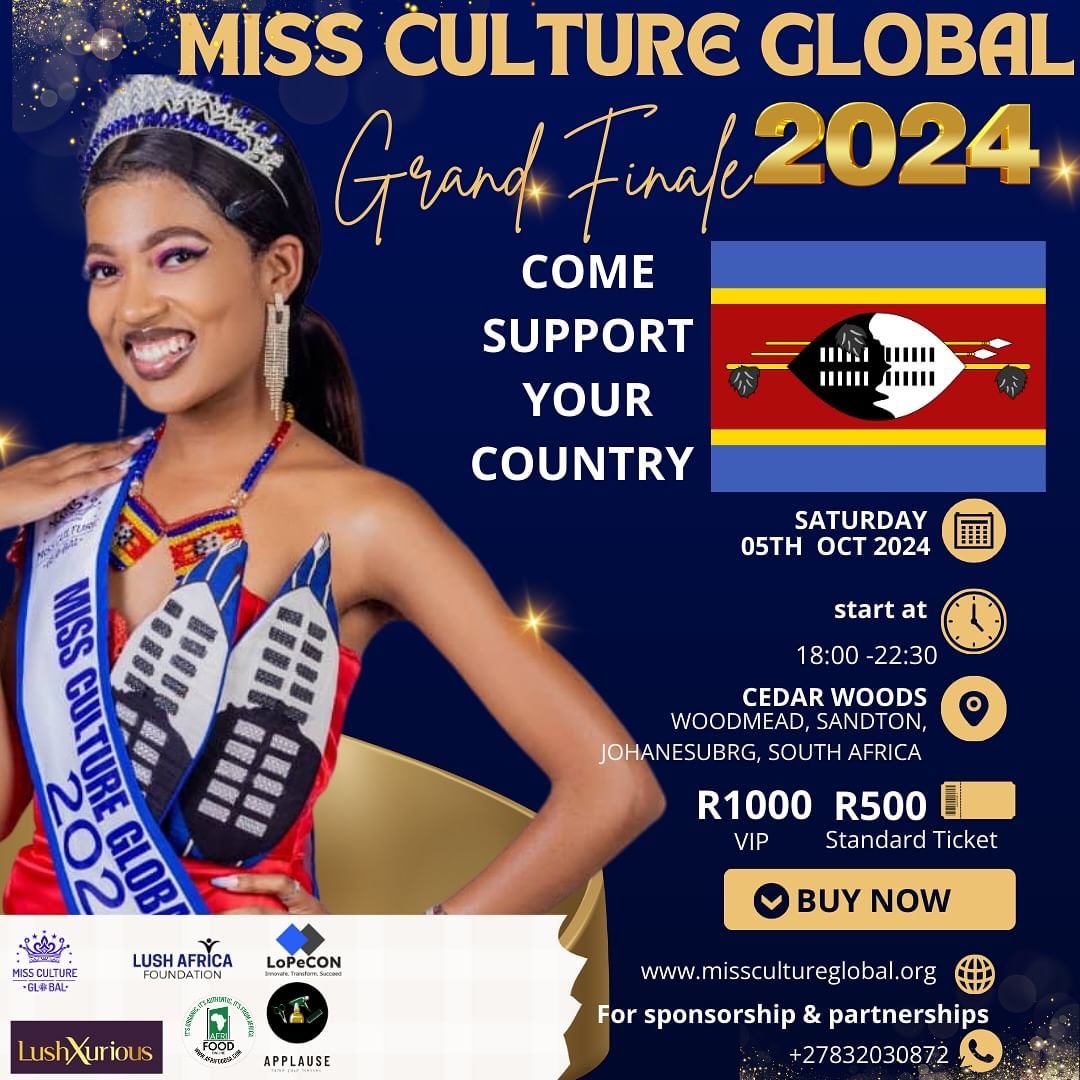 Contestant representing Eswatini in Miss Culture Global 2024
Contestant representing Eswatini in Miss Culture Global 2024
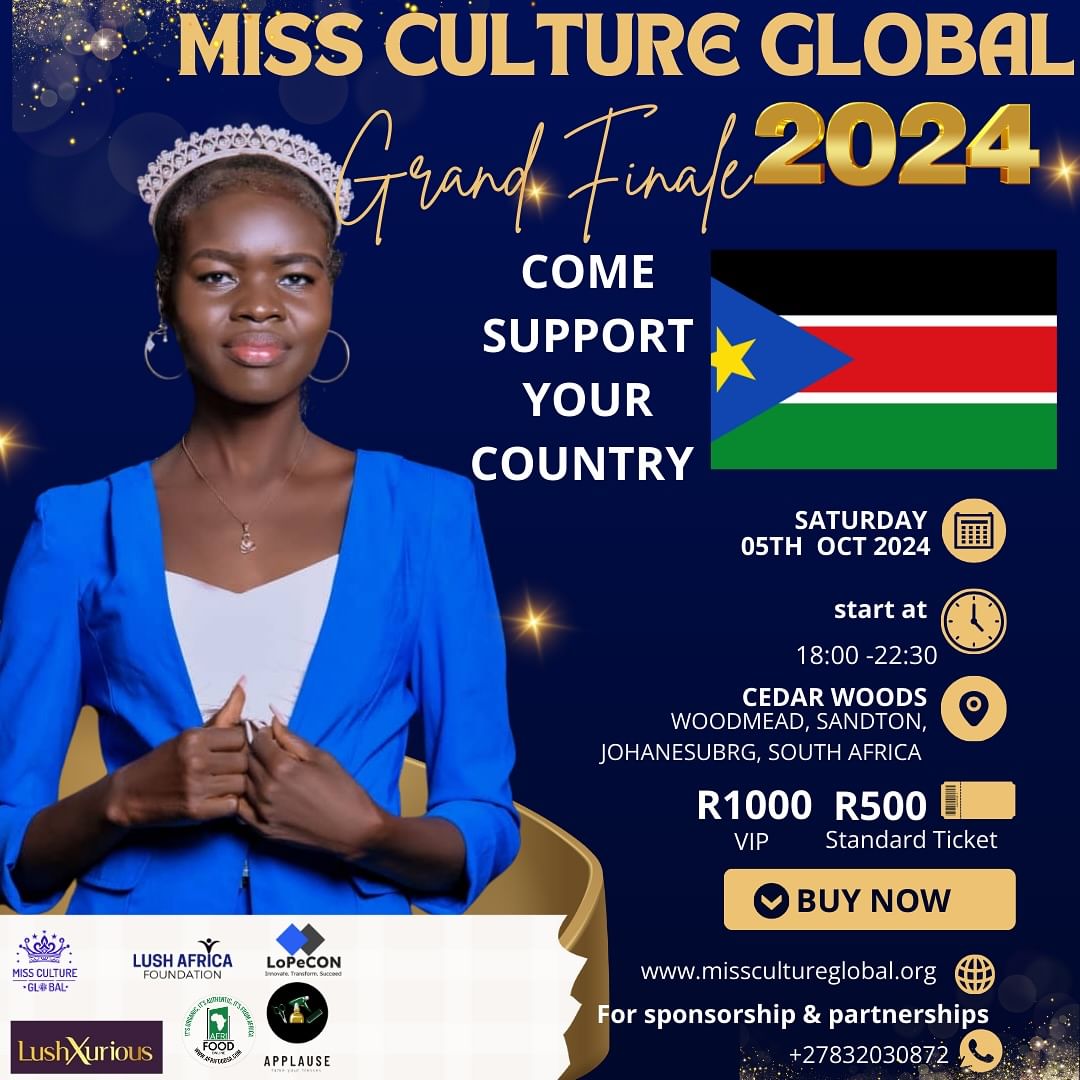 Contestant representing South Suda in Miss Culture Global 2024
Contestant representing South Suda in Miss Culture Global 2024
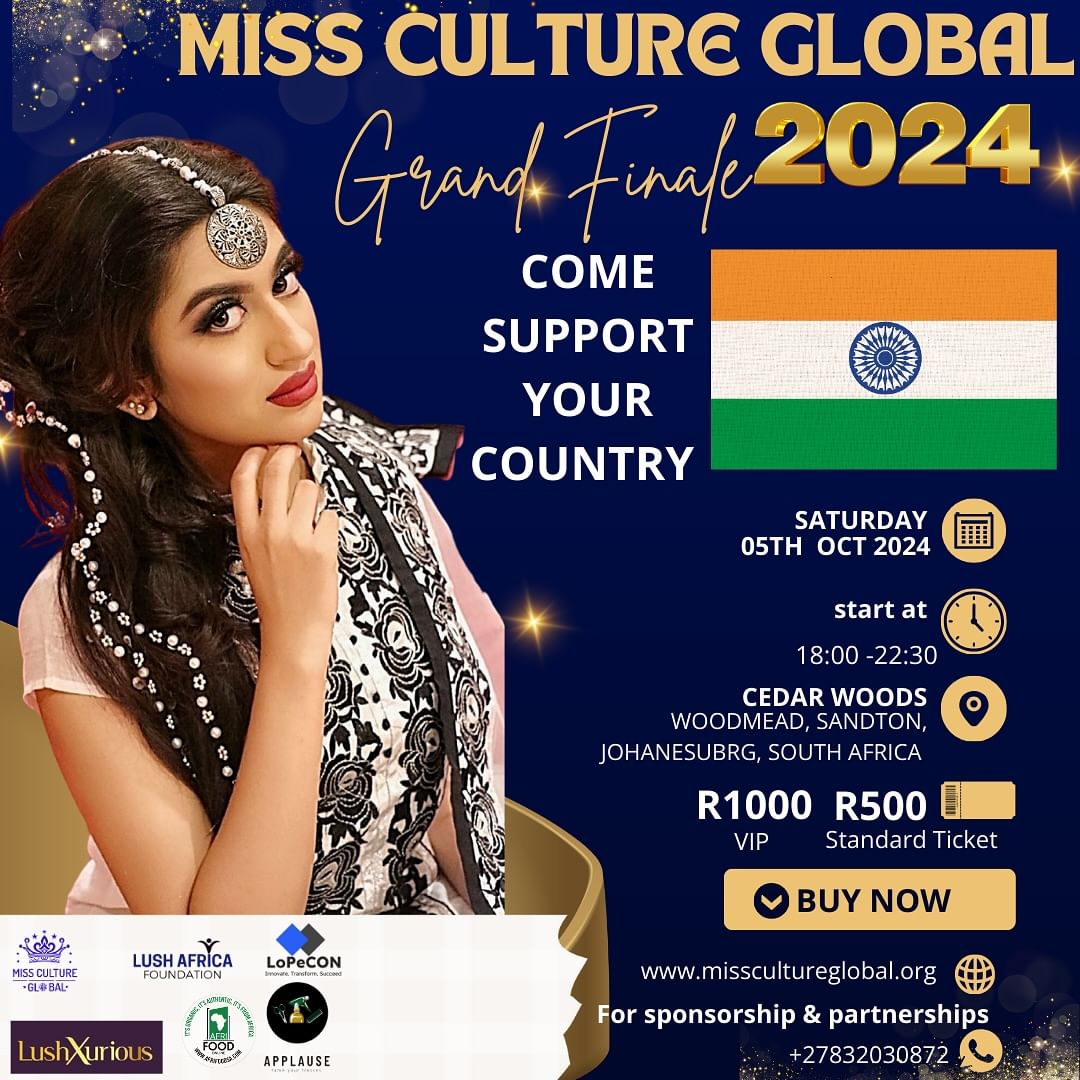 Contestant representing India in Miss Culture Global 2024
Contestant representing India in Miss Culture Global 2024
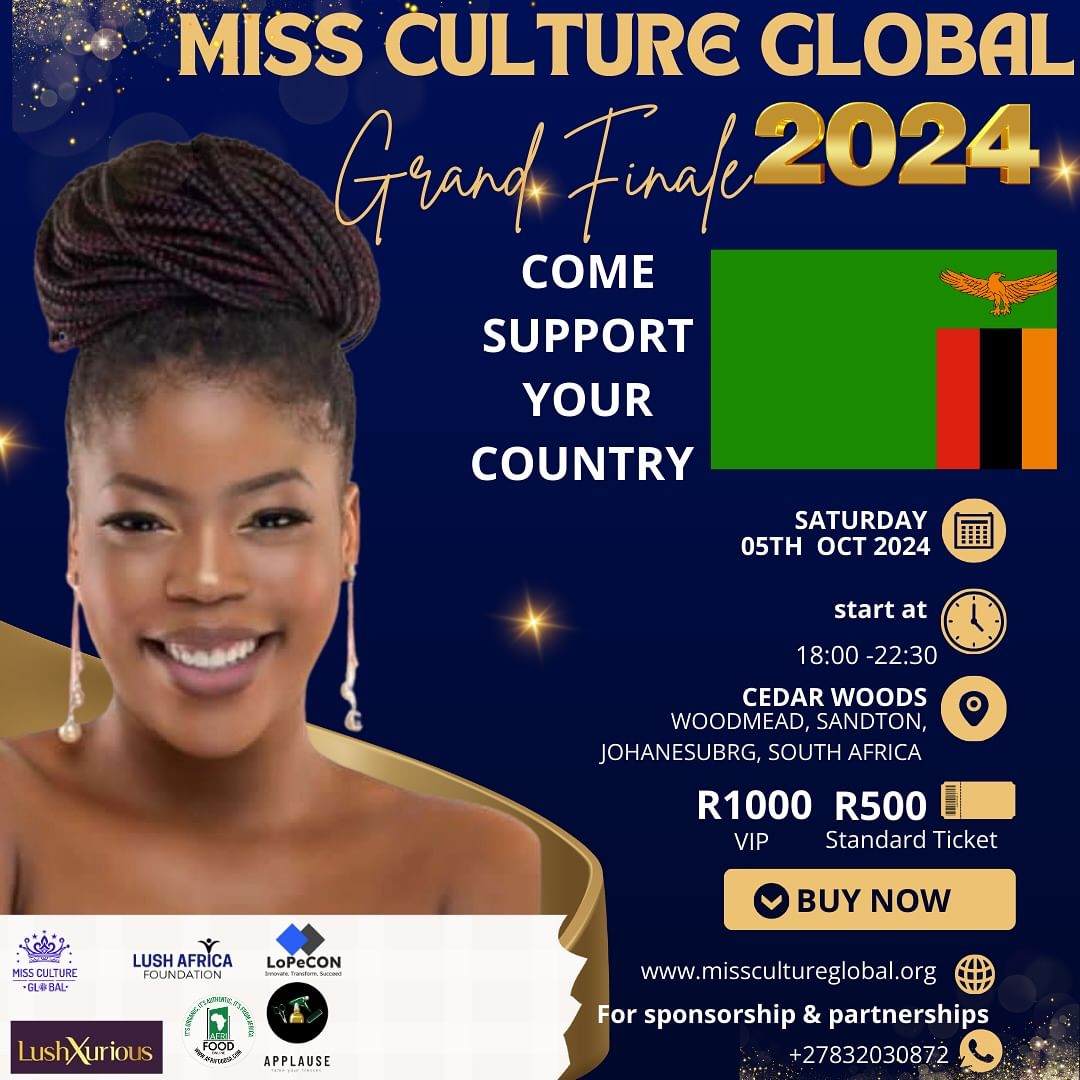 Contestant representing Zambia in Miss Culture Global 2024
Contestant representing Zambia in Miss Culture Global 2024
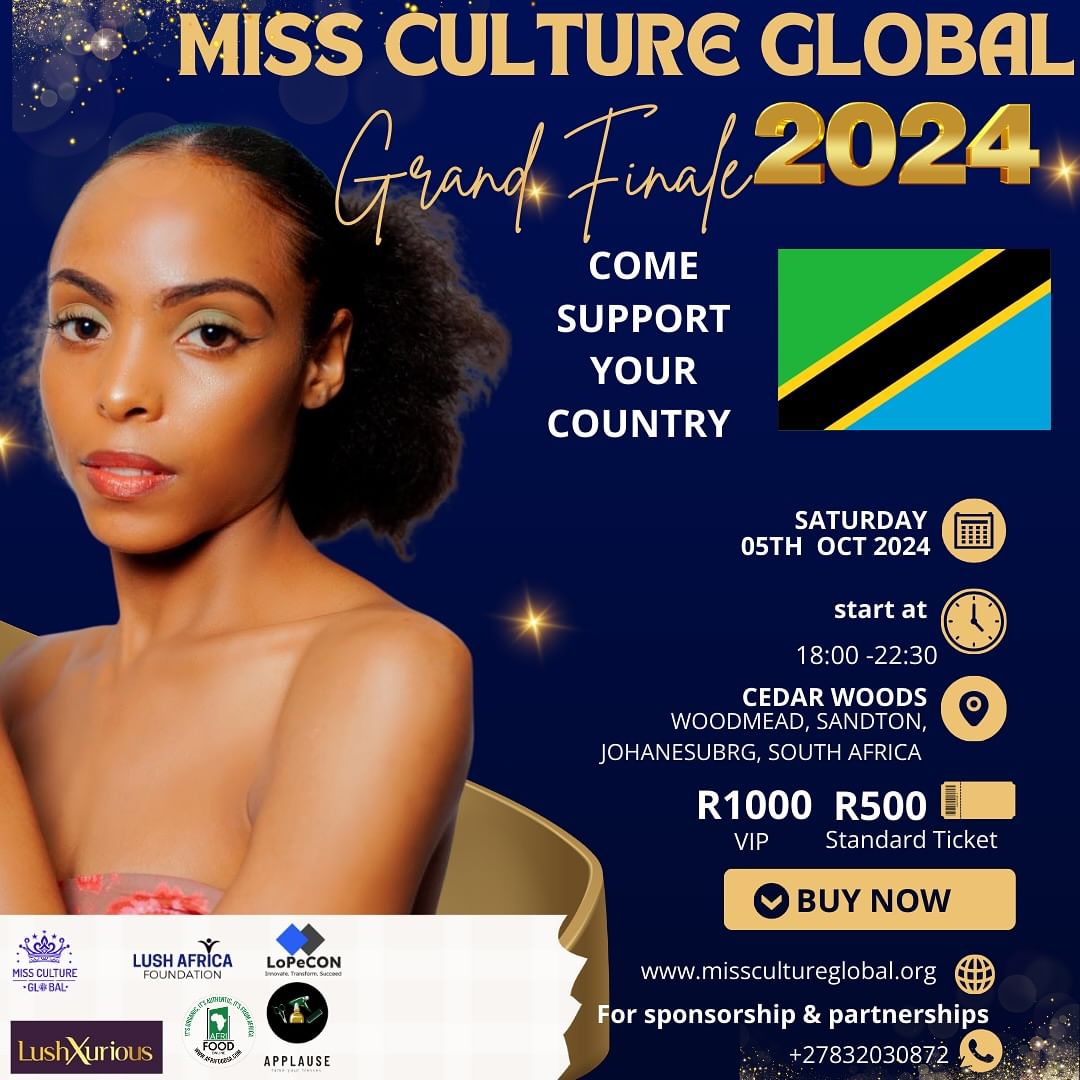 Contestant representing Tanzania in Miss Culture Global 2024
Contestant representing Tanzania in Miss Culture Global 2024
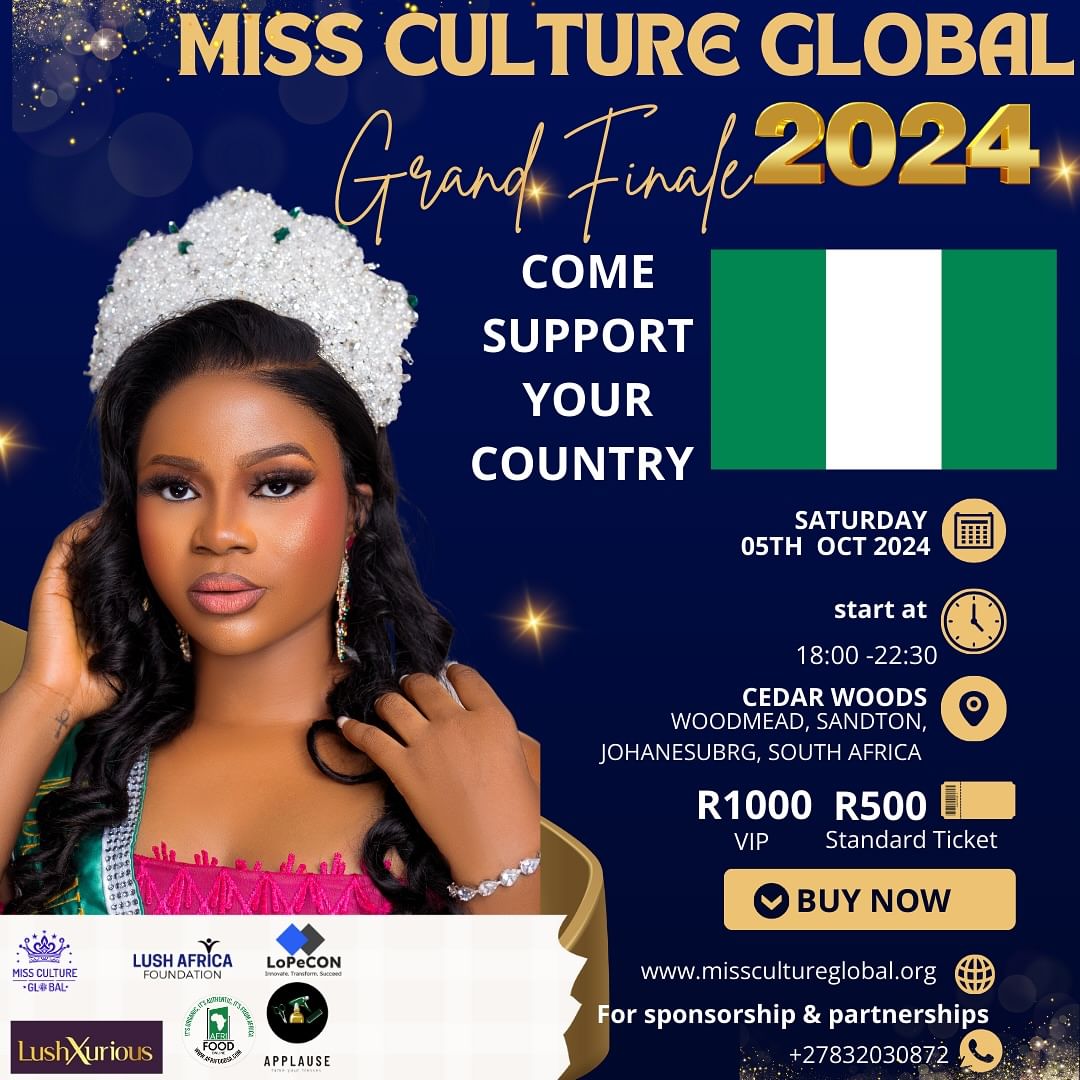 Contestant representing Nigeria in Miss Culture Global 2024
Contestant representing Nigeria in Miss Culture Global 2024
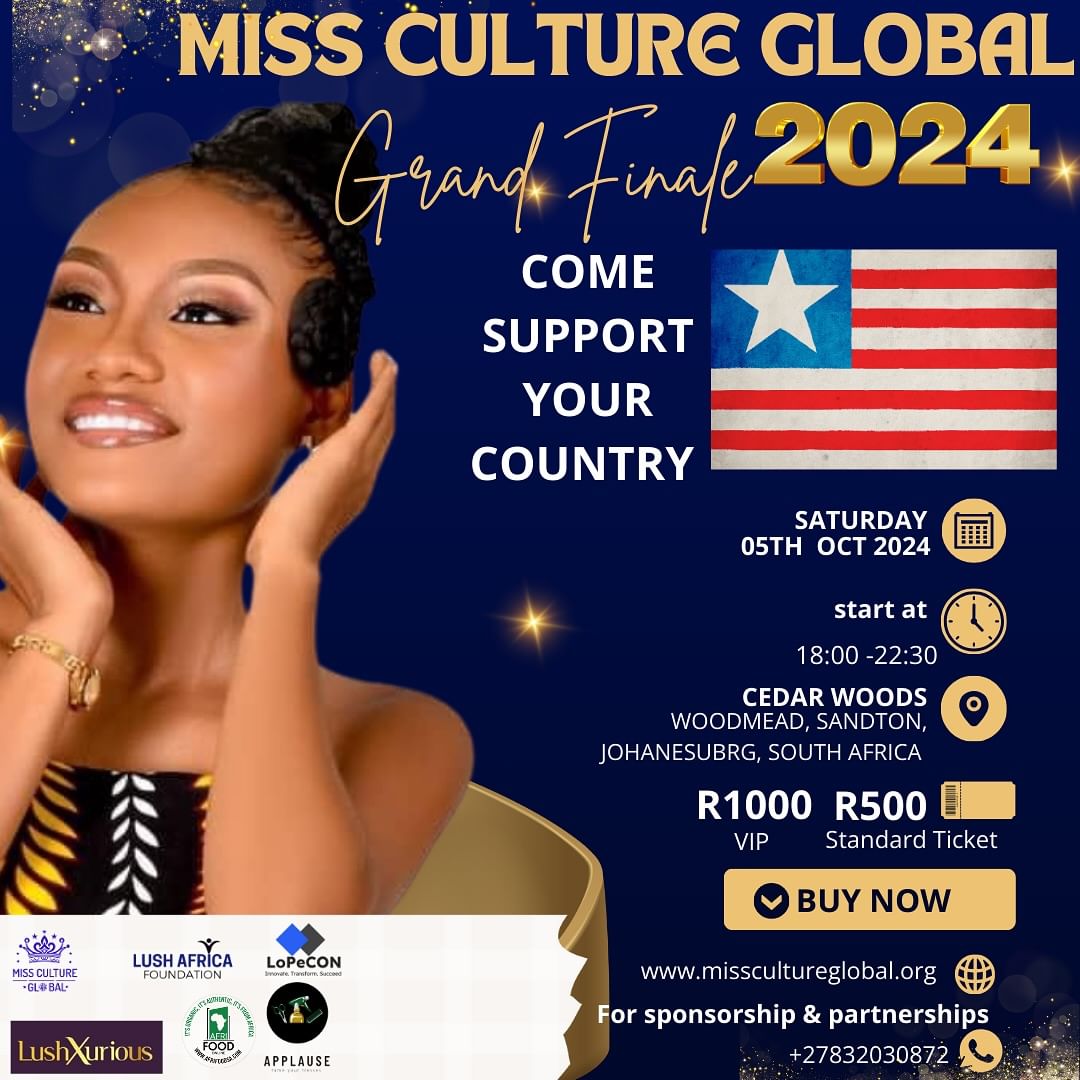 Contestant representing Liberia in Miss Culture Global 2024
Contestant representing Liberia in Miss Culture Global 2024
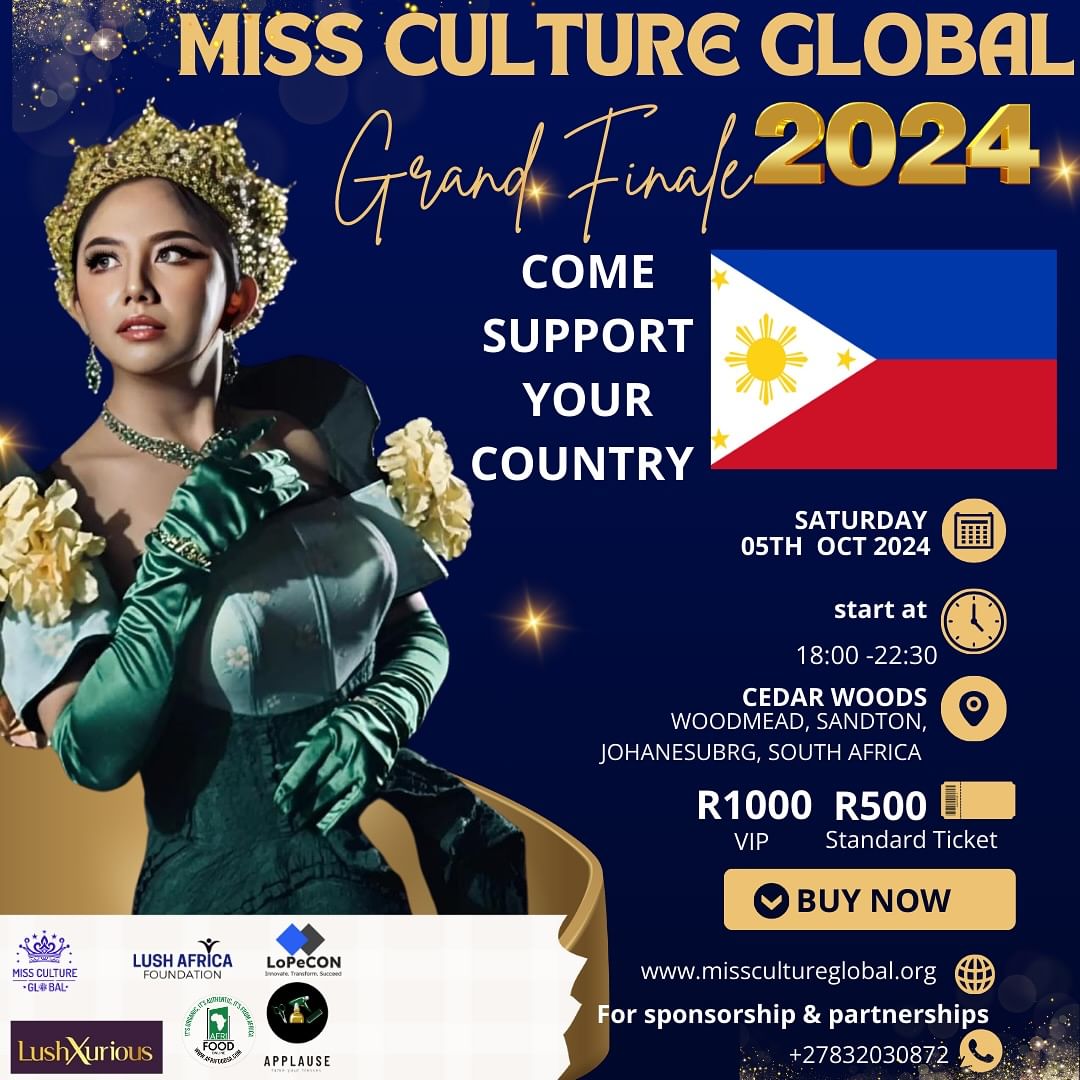 Contestant representing the Philippines in Miss Culture Global 2024
Contestant representing the Philippines in Miss Culture Global 2024
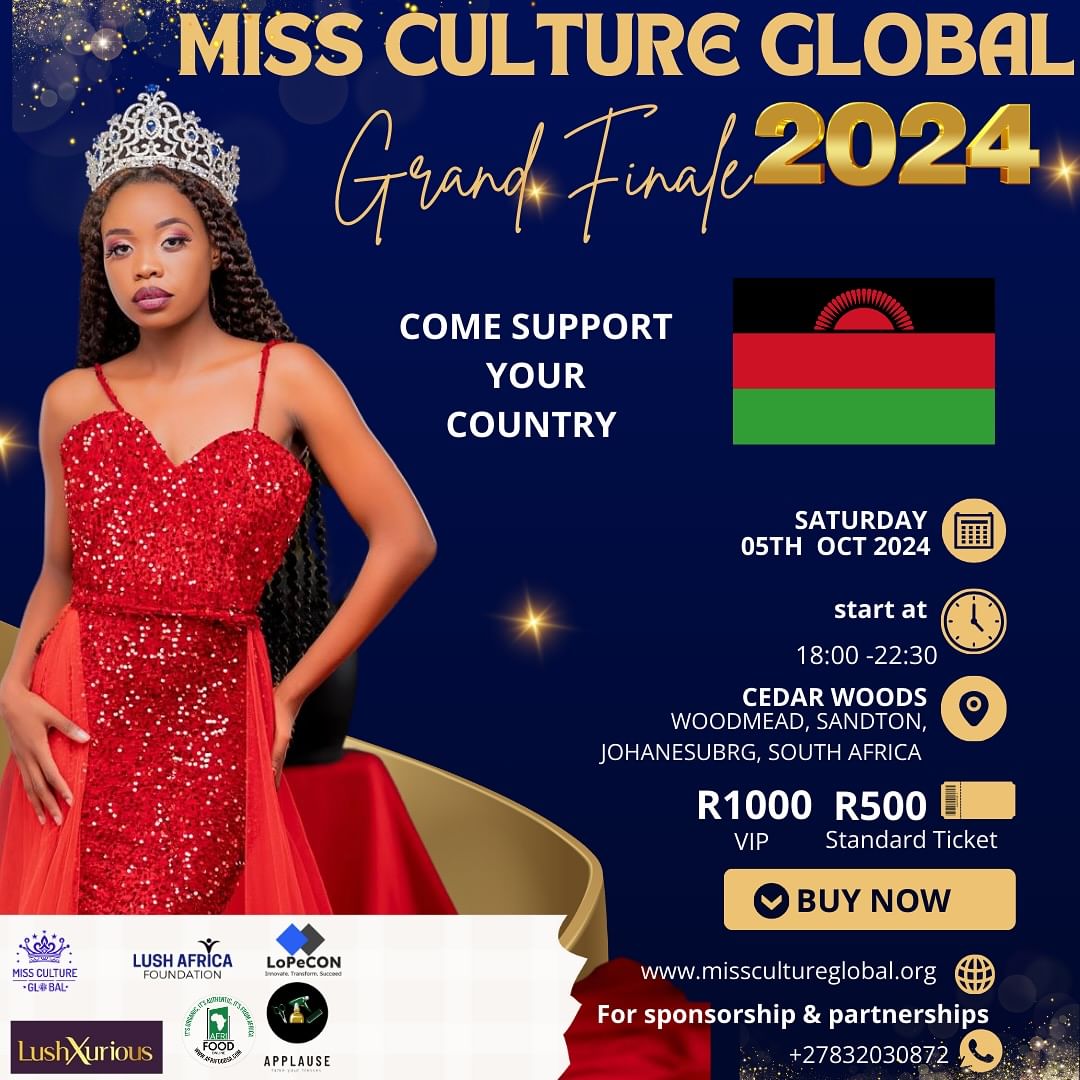 Contestant representing Malawi in Miss Culture Global 2024
Contestant representing Malawi in Miss Culture Global 2024
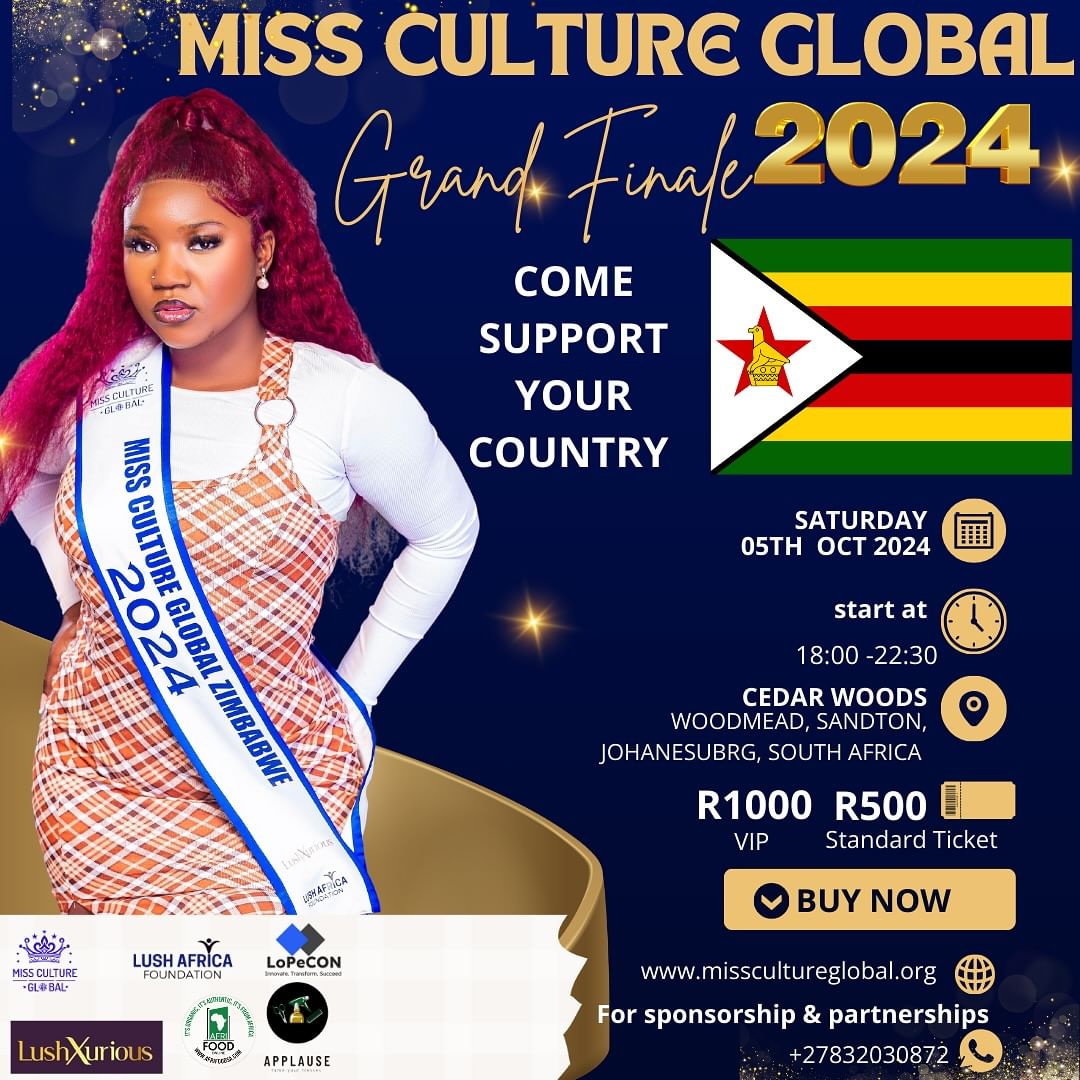 Contestant representing Zimbabwe in Miss Culture Global 2024
Contestant representing Zimbabwe in Miss Culture Global 2024
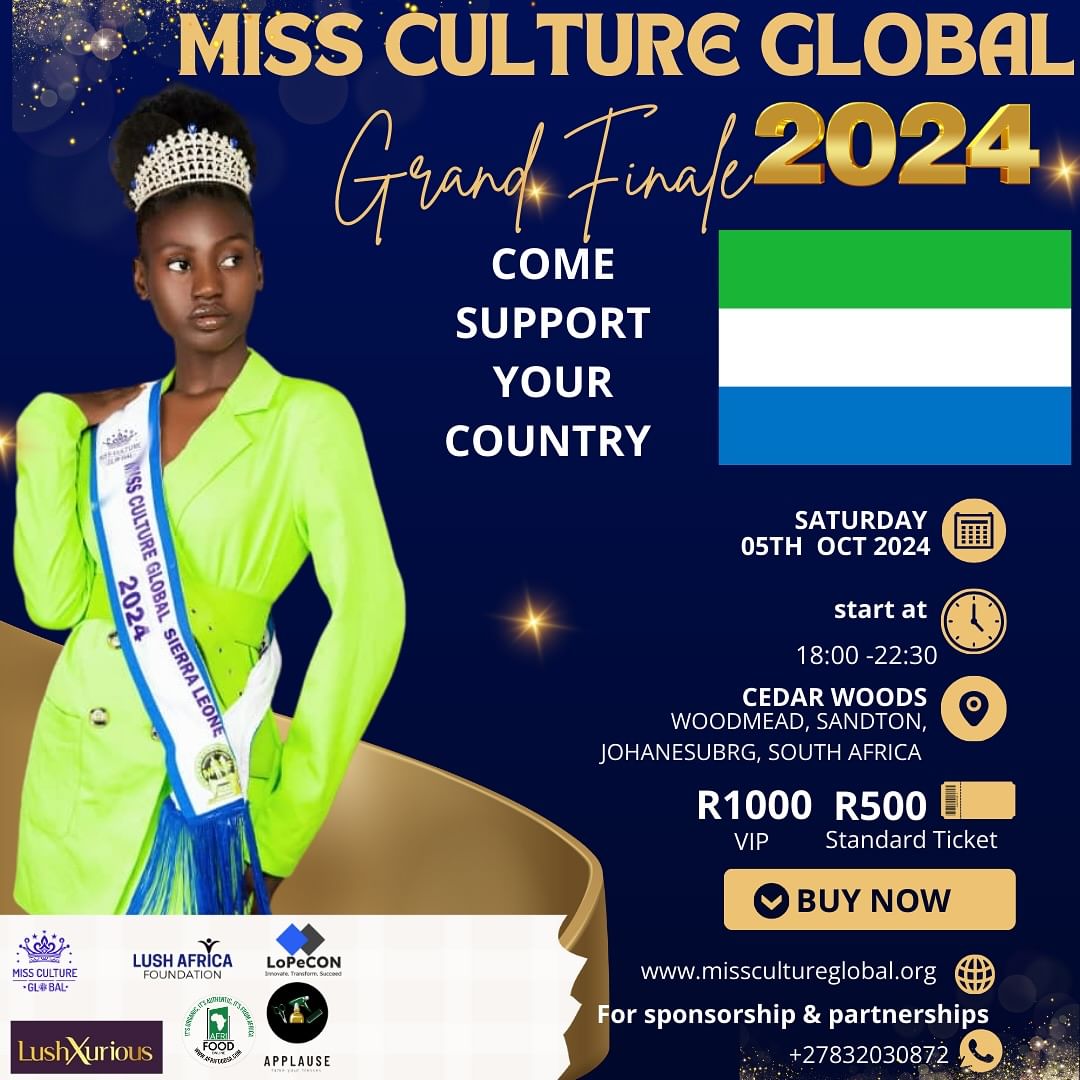 Contestant representing Sierra Leone in Miss Culture Global 2024
Contestant representing Sierra Leone in Miss Culture Global 2024
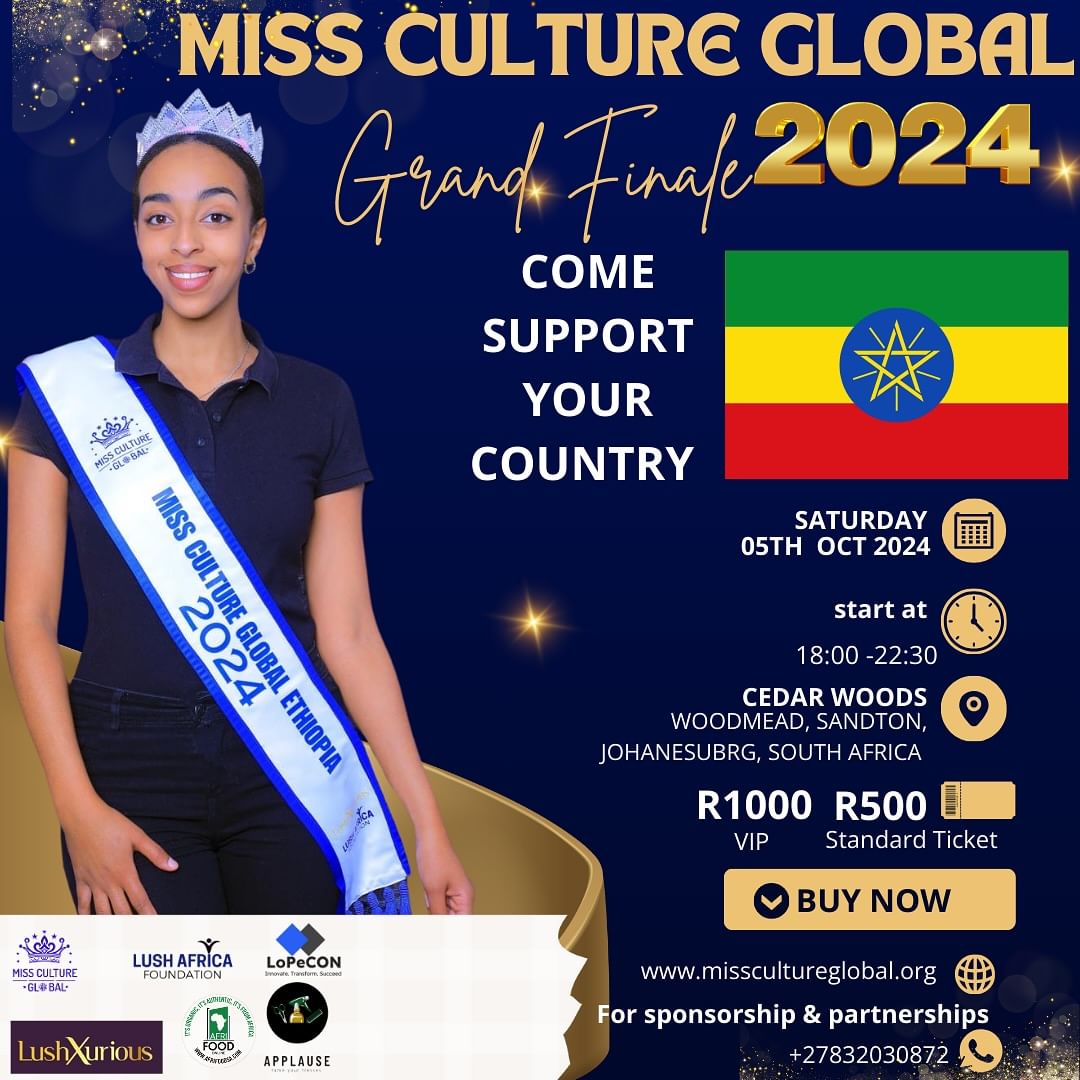 Contestant representing Ethiopia in Miss Culture Global 2024
Contestant representing Ethiopia in Miss Culture Global 2024
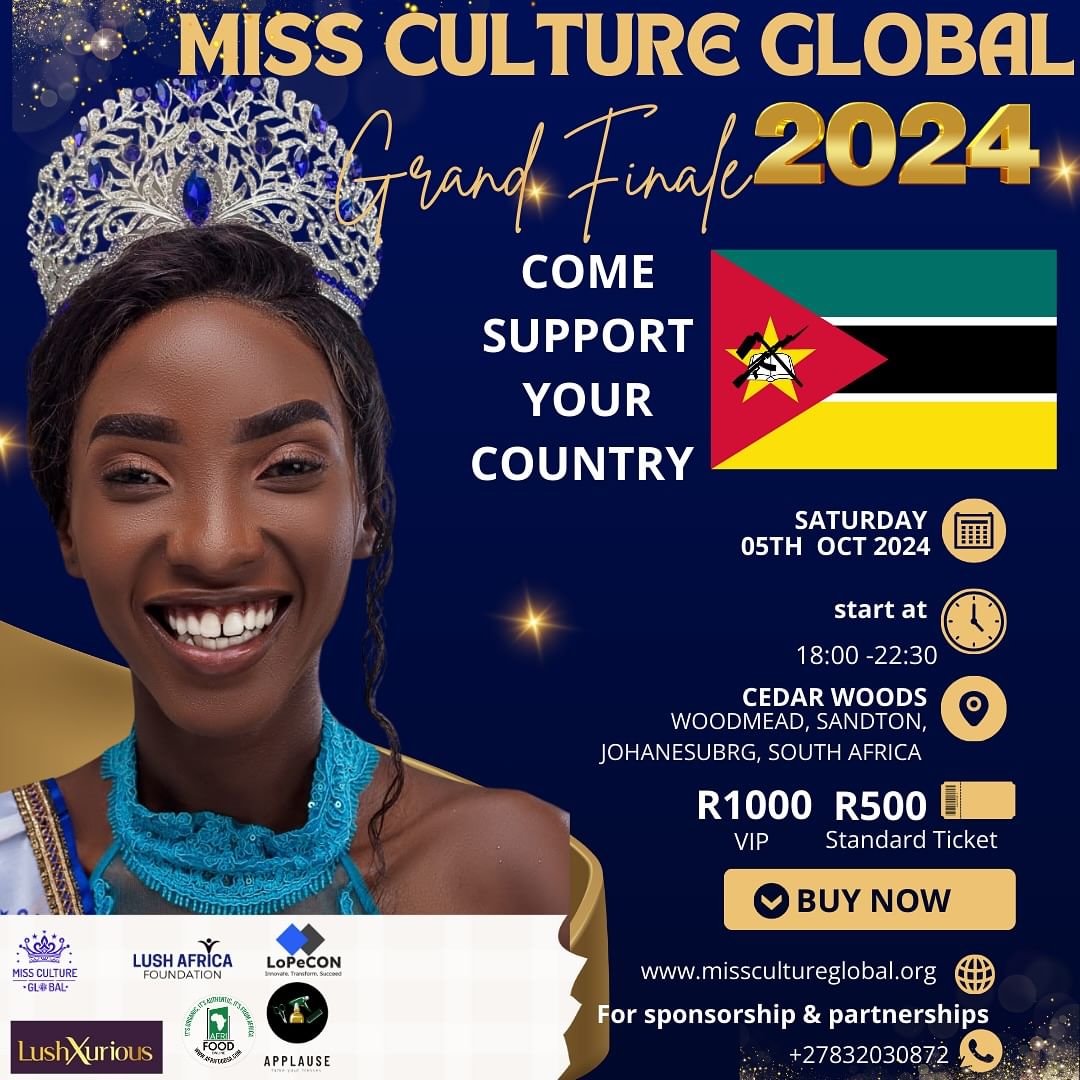 Contestant representing Mozambique in Miss Culture Global 2024
Contestant representing Mozambique in Miss Culture Global 2024
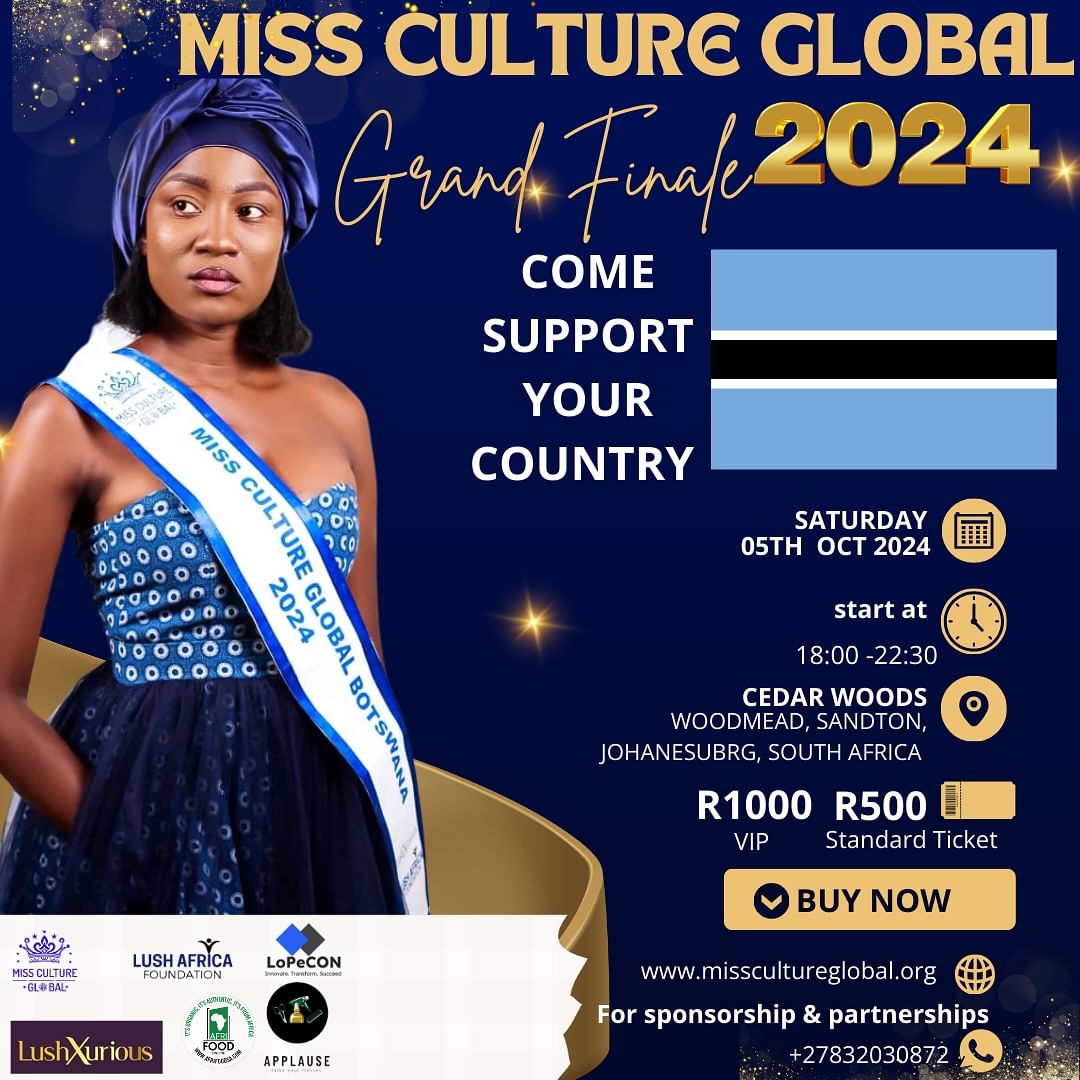 Contestant representing Botswana in Miss Culture Global 2024
Contestant representing Botswana in Miss Culture Global 2024
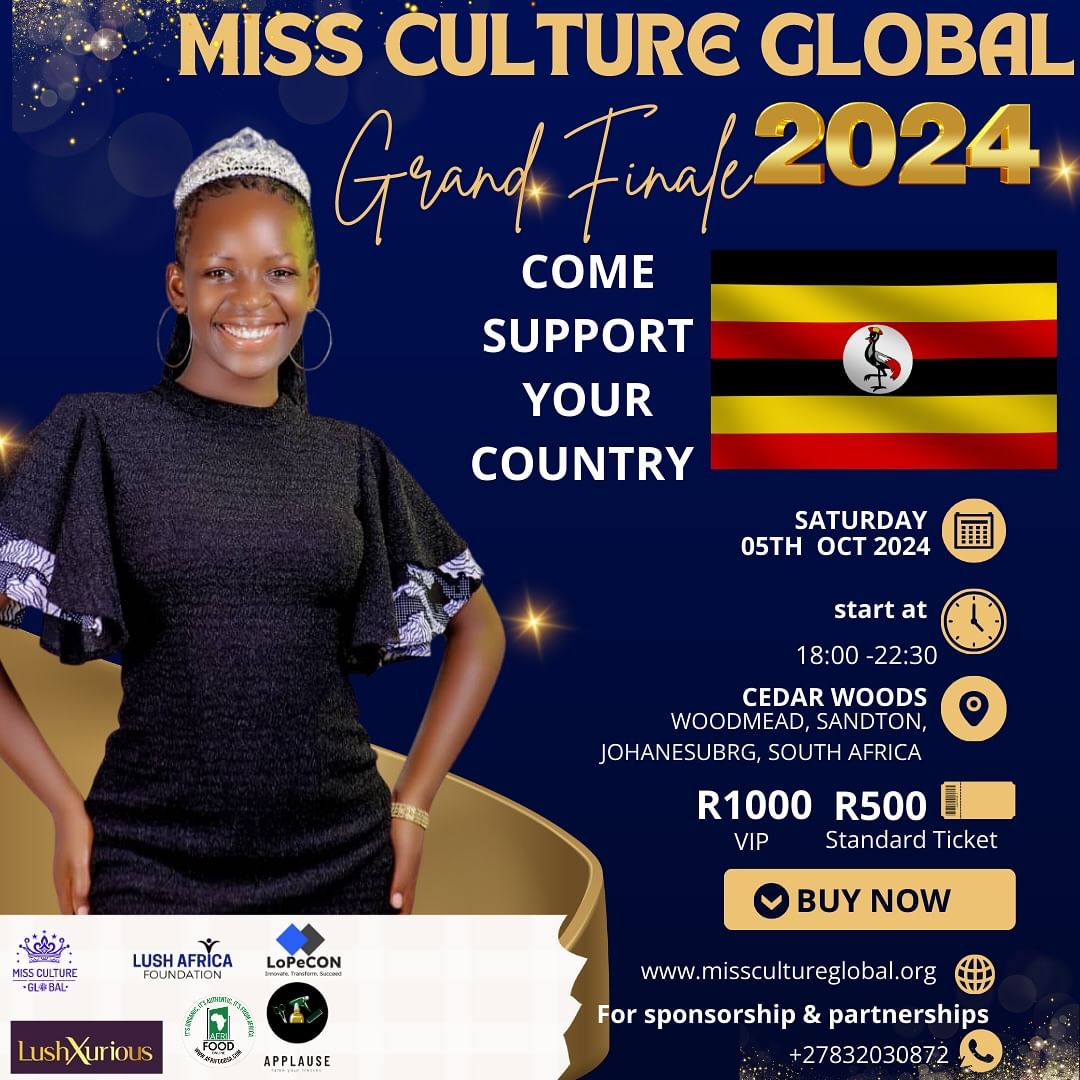 Contestant representing Uganda in Miss Culture Global 2024
Contestant representing Uganda in Miss Culture Global 2024
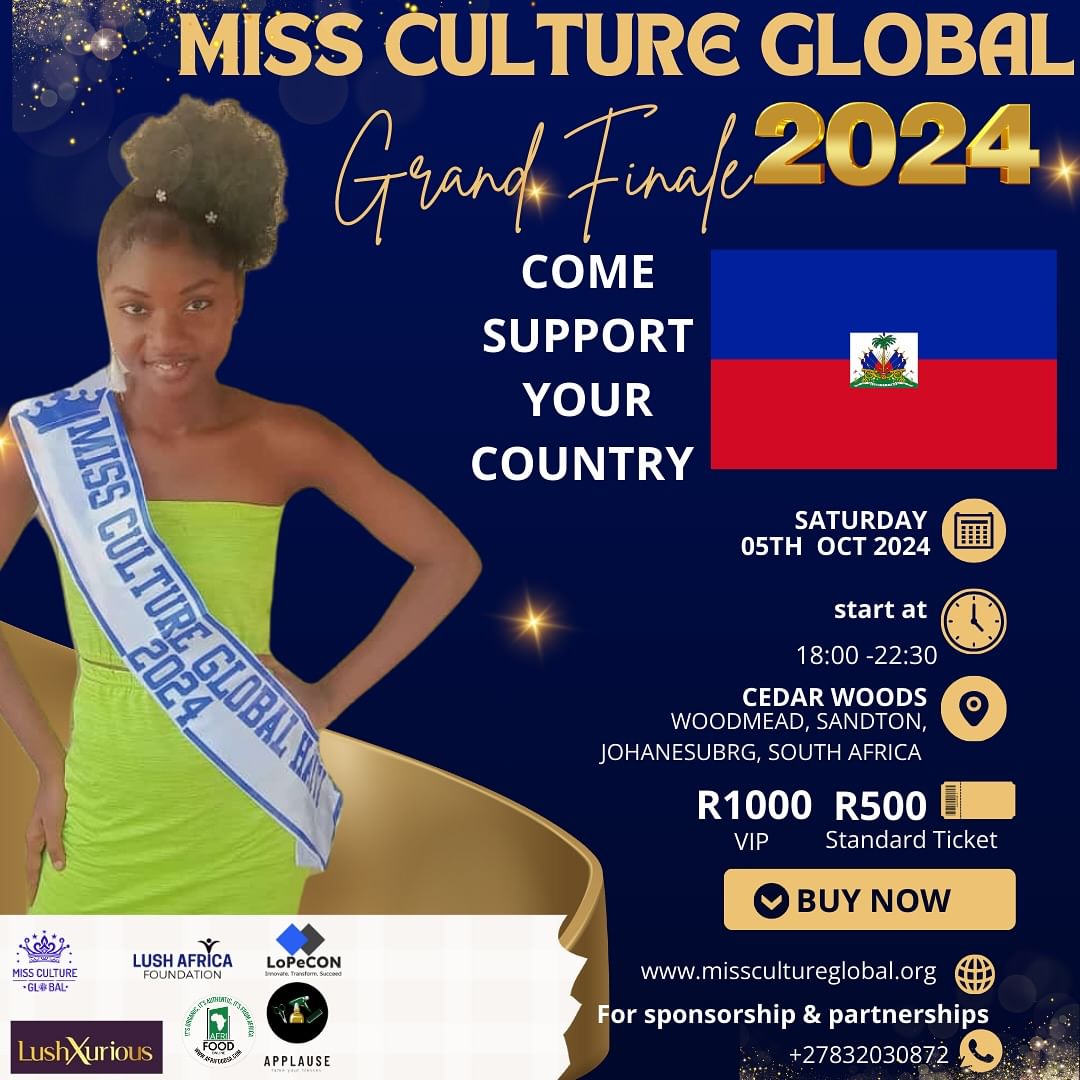 Contestant representing Haiti in Miss Culture Global 2024
Contestant representing Haiti in Miss Culture Global 2024
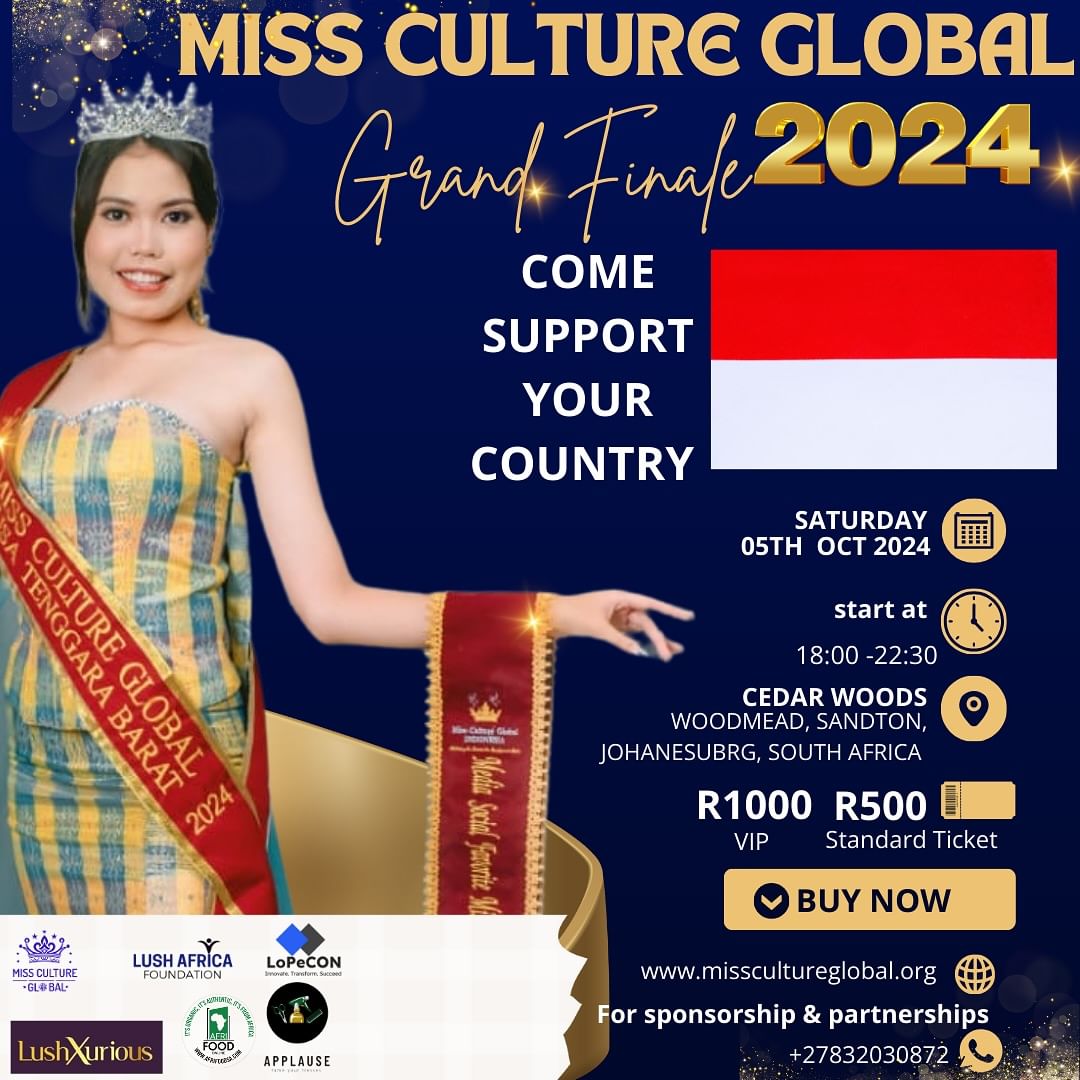 Contestant representing Indonesia in Miss Culture Global 2024
Contestant representing Indonesia in Miss Culture Global 2024
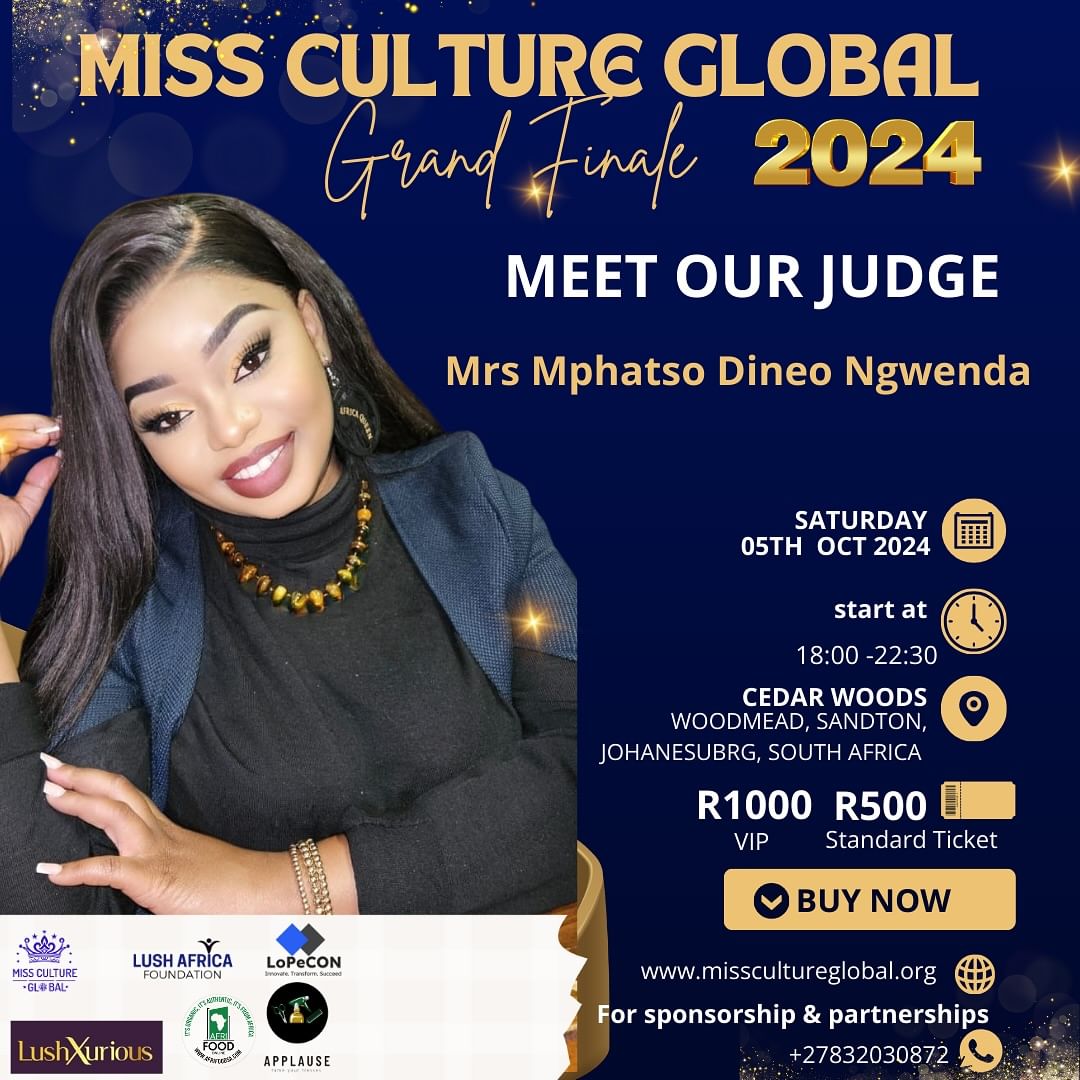 The judge Mrs Mphatso Dineo Ngwenda in Miss Culture Global 2024
The judge Mrs Mphatso Dineo Ngwenda in Miss Culture Global 2024
 The judge Ms Landi Lombard in Miss Culture Global 2024
The judge Ms Landi Lombard in Miss Culture Global 2024
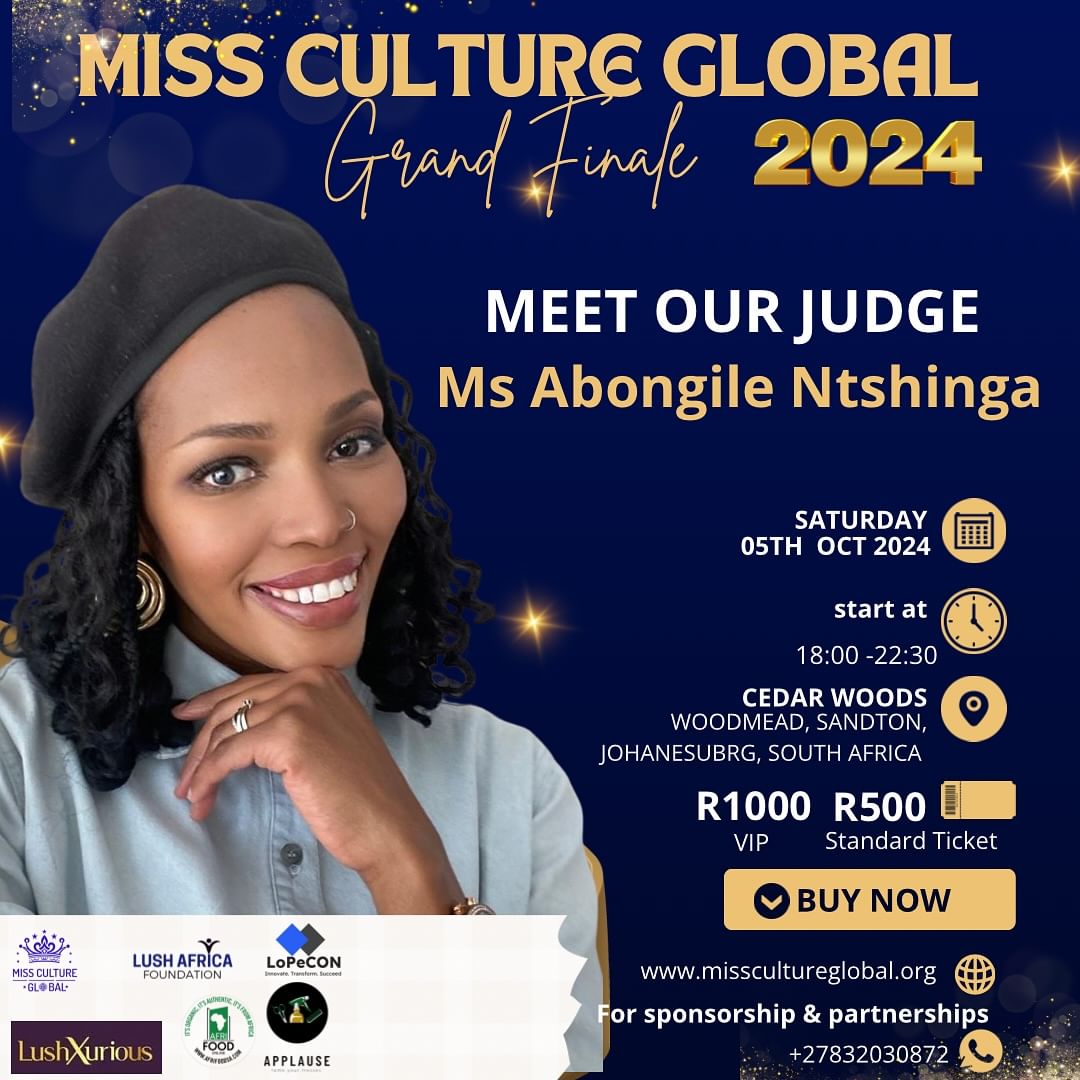 The judge Ms Abongile Ntshinga in Miss Culture Global 2024
The judge Ms Abongile Ntshinga in Miss Culture Global 2024
Who Will Win Miss Culture Global 2024?: 20 Countries will be Represented
The Miss Culture Global Grand Finale 2024 is set to dazzle audiences in Sandton, Johannesburg, South Africa. This prestigious event will unfold at the exquisite Cedarwood of Sandton in Woodmead, bringing together 20 contestants from diverse nations to compete for the coveted crown

Lorraine Kljajic, CEO of Miss Culture Global and the visionary behind this continental pageant, spoke with RCFS's Media about the upcoming event. "We have confirmed participation from 20 countries, and we're finalizing the list shortly," Kljajic stated. "Our next steps involve strengthening communication with participants and assisting with travel arrangements, including flight bookings and airport transfers for those coming from outside Africa."
The pageant's mission extends beyond beauty, aiming to empower women regardless of their physical attributes. "This event provides an opportunity for all women, irrespective of their size, height, or skin color," Kljajic emphasized. "Our main objective is to empower these women through entrepreneurship and education."
Kljajic and her team are actively seeking partnerships to amplify their impact on the African community. "We're looking for more partners to help us achieve our objectives," she explained. "There's still time for interested parties to get involved and support our cause. Those who can't join us this year are welcome to collaborate in the future."
 Fouth from the Right- Lorraine Kljajic, CEO of Miss Culture Global with the winner Miss Culture Global South Africa
Fouth from the Right- Lorraine Kljajic, CEO of Miss Culture Global with the winner Miss Culture Global South Africa
The choice of venue underscores the event's prestige. "The Cedarwood of Sandton offers a stunning backdrop for this event," Kljajic noted. "Located in the heart of Woodmead, it provides an elegant setting, ensuring an unforgettable experience for all involved."
MISS CULTURE GLOBAL, run by the Lush Africa Foundation, is more than just a beauty pageant. It's a platform designed to showcase talent, empower individuals, and celebrate diversity. The organization's core focus is to unite people from various cultures, fostering mutual learning and understanding in pursuit of transformation and change.
 Contestant representing South Africa in Miss Culture Global 2024
Contestant representing South Africa in Miss Culture Global 2024
ALSO READ: All Eyes on Africa: Miss Culture Global Grande Finale 2024 in Johannesburg
Key objectives of Miss Culture Global include:
- Promoting art, culture, and tourism destinations worldwide
- Empowering young women through personal development and talent cultivation
- Encouraging volunteer activities and cultural events
- Creating an environment that embraces cultural differences, promoting unity and humanity
- Facilitating creativity and information exchange among different nationalities
- Attracting investment to host countries and cities, fostering business opportunities and employment
As the grand finale approaches, anticipation builds for this unique celebration of beauty, culture, and empowerment. The event promises not only to crown a winner but also to foster global understanding and showcase the rich tapestry of human diversity. With contestants from 20 countries vying for the title, Miss Culture Global 2024 is poised to be a spectacular display of talent, grace, and cultural pride. As the world watches, one question remains: Who will emerge victorious and claim the crown of Miss Culture Global 2024?
 Contestant representing Rwanda in Miss Culture Global 2024
Contestant representing Rwanda in Miss Culture Global 2024
 Contestant representing Namibia in Miss Culture Global 2024
Contestant representing Namibia in Miss Culture Global 2024
 Contestant representing Eswatini in Miss Culture Global 2024
Contestant representing Eswatini in Miss Culture Global 2024
 Contestant representing South Suda in Miss Culture Global 2024
Contestant representing South Suda in Miss Culture Global 2024
 Contestant representing India in Miss Culture Global 2024
Contestant representing India in Miss Culture Global 2024
 Contestant representing Zambia in Miss Culture Global 2024
Contestant representing Zambia in Miss Culture Global 2024
 Contestant representing Tanzania in Miss Culture Global 2024
Contestant representing Tanzania in Miss Culture Global 2024
 Contestant representing Nigeria in Miss Culture Global 2024
Contestant representing Nigeria in Miss Culture Global 2024
 Contestant representing Liberia in Miss Culture Global 2024
Contestant representing Liberia in Miss Culture Global 2024
 Contestant representing the Philippines in Miss Culture Global 2024
Contestant representing the Philippines in Miss Culture Global 2024
 Contestant representing Malawi in Miss Culture Global 2024
Contestant representing Malawi in Miss Culture Global 2024
 Contestant representing Zimbabwe in Miss Culture Global 2024
Contestant representing Zimbabwe in Miss Culture Global 2024
 Contestant representing Sierra Leone in Miss Culture Global 2024
Contestant representing Sierra Leone in Miss Culture Global 2024
 Contestant representing Ethiopia in Miss Culture Global 2024
Contestant representing Ethiopia in Miss Culture Global 2024
 Contestant representing Mozambique in Miss Culture Global 2024
Contestant representing Mozambique in Miss Culture Global 2024
 Contestant representing Botswana in Miss Culture Global 2024
Contestant representing Botswana in Miss Culture Global 2024
 Contestant representing Uganda in Miss Culture Global 2024
Contestant representing Uganda in Miss Culture Global 2024
 Contestant representing Haiti in Miss Culture Global 2024
Contestant representing Haiti in Miss Culture Global 2024
 Contestant representing Indonesia in Miss Culture Global 2024
Contestant representing Indonesia in Miss Culture Global 2024
 The judge Mrs Mphatso Dineo Ngwenda in Miss Culture Global 2024
The judge Mrs Mphatso Dineo Ngwenda in Miss Culture Global 2024
 The judge Ms Landi Lombard in Miss Culture Global 2024
The judge Ms Landi Lombard in Miss Culture Global 2024
 The judge Ms Abongile Ntshinga in Miss Culture Global 2024
The judge Ms Abongile Ntshinga in Miss Culture Global 2024
LATEST NEWS
Turning Locals into the Next Sustainable Fashion Designers in Kenya: Maisha by Nisria
16 September 2024 283 hitsTurning Locals into the Next Sustainable Fashion Designers in Kenya: Maisha by Nisria When Nur M'Nasria, a TV film producer,…
Tanga Designs Wins Best Dressed Male at The Silver Gala 2024: Interview with CEO Olivier Niyitanga
11 September 2024 892 hitsTanga Designs Wins Best Dressed Male at The Silver Gala 2024: Interview with CEO Olivier Niyitanga Tanga Designs has become…
Top 10 Dresses That Raised Emotions at the Silver Gala 2024: A Night of Glamour, Entertainment, and Impact
10 September 2024 2276 hitsTop 10 Dresses That Raised Emotions at the Silver Gala 2024: A Night of Glamour, Entertainment, and Impact Last weekend,…
Who Was the Most Fashionable at the Silver Gala 2024 in Kigali?
09 September 2024 976 hitsWho Was the Most Fashionable at the Silver Gala 2024 in Kigali? Kigali's fashion scene reached new heights at the…
What are the Innovations Behind African Print?
08 September 2024 863 hitsWhat are the Innovations Behind African Print? African print, with its vibrant colors and bold patterns, has long been a…
Who Will Win Miss Culture Global 2024?: 20 Countries will be Represented
06 September 2024 1966 hitsWho Will Win Miss Culture Global 2024?: 20 Countries will be Represented The Miss Culture Global Grand Finale 2024 is…
FASHION SHOPS




![[PHOTO: From the right Nur M'Nasria the brain behind Maisha by Nisria community organization based in Kenya "From waste to body" ]](/media/k2/items/cache/832731af5d81b95ba82de72993209600_Generic.jpg)
![[PHOTO: From the right Nur M'Nasria the brain behind Maisha by Nisria community organization based in Kenya "From waste to body" ]](/media/k2/items/cache/91b1b90c684fd8e5c2ec1b7418ca380f_Generic.jpg)
![[PHOTO: Tanga Designs Wins Best Dressed Male at The Silver Gala 2024: CEO and Creative Designer Olivier Niyitanga holing his award at the Kigali Convention Center]](/media/k2/items/cache/390c9d1de2a80a844d0e01ba21c1192e_Generic.jpg)
![[PHOTO: Tanga Designs Wins Best Dressed Male at The Silver Gala 2024: CEO and Creative Designer Olivier Niyitanga holing his award at the Kigali Convention Center]](/media/k2/items/cache/36344ca48475f863c1fe44d1c1cfab3f_Generic.jpg)
![[PHOTO: From left- Musician Bwiza, International dancer and choreographer Sherrie Silver, Isimbi model and TV presenter Darcy during The Silver Gala 2024 at the Kigali Convention Centre Auditorium]](/media/k2/items/cache/45ff2190802f9793d44160c4e551925c_Generic.jpg)
![PHOTO: Jolly Mutesi-Miss Rwanda 2016, Rwandaise ´s top musician The Ben, and Nigerian singer, songwriter and producer Runtown with Sherrie Silver and former model Sandrine Mucyo during The Silver Gala 2024, at Kigali Convention Center Auditorium]](/media/k2/items/cache/78a1f76203c562c3d7c318765865da44_Generic.jpg)
![PHOTO: Jolly Mutesi-Miss Rwanda 2016, Rwandaise ´s top musician The Ben, and Nigerian singer, songwriter and producer Runtown with Sherrie Silver and former model Sandrine Mucyo during The Silver Gala 2024, at Kigali Convention Center Auditorium]](/media/k2/items/cache/f3b735e3300faff0e348331a5413d4d3_Generic.jpg)
![[PHOTO: Collection and print fabrics by Mille Collines, fashion brand born in Rwanda and operates in South Africa]](/media/k2/items/cache/f75f45065e491a3adc61e72a384867bb_Generic.jpg)






![[PHOTO: Contestants from 20 countries are ready for the final of the Miss Culture Global 2024, taking a place in Johannesburg, South Africa]](/media/k2/items/cache/ceec46ac75e6be7f73874fd5573b298d_Generic.jpg)
![[PHOTO: Contestants from 20 countries are ready for the final of the Miss Culture Global 2024, taking a place in Johannesburg, South Africa]](/media/k2/items/cache/34649abc993982b197aa9a6210af69ed_Generic.jpg)

